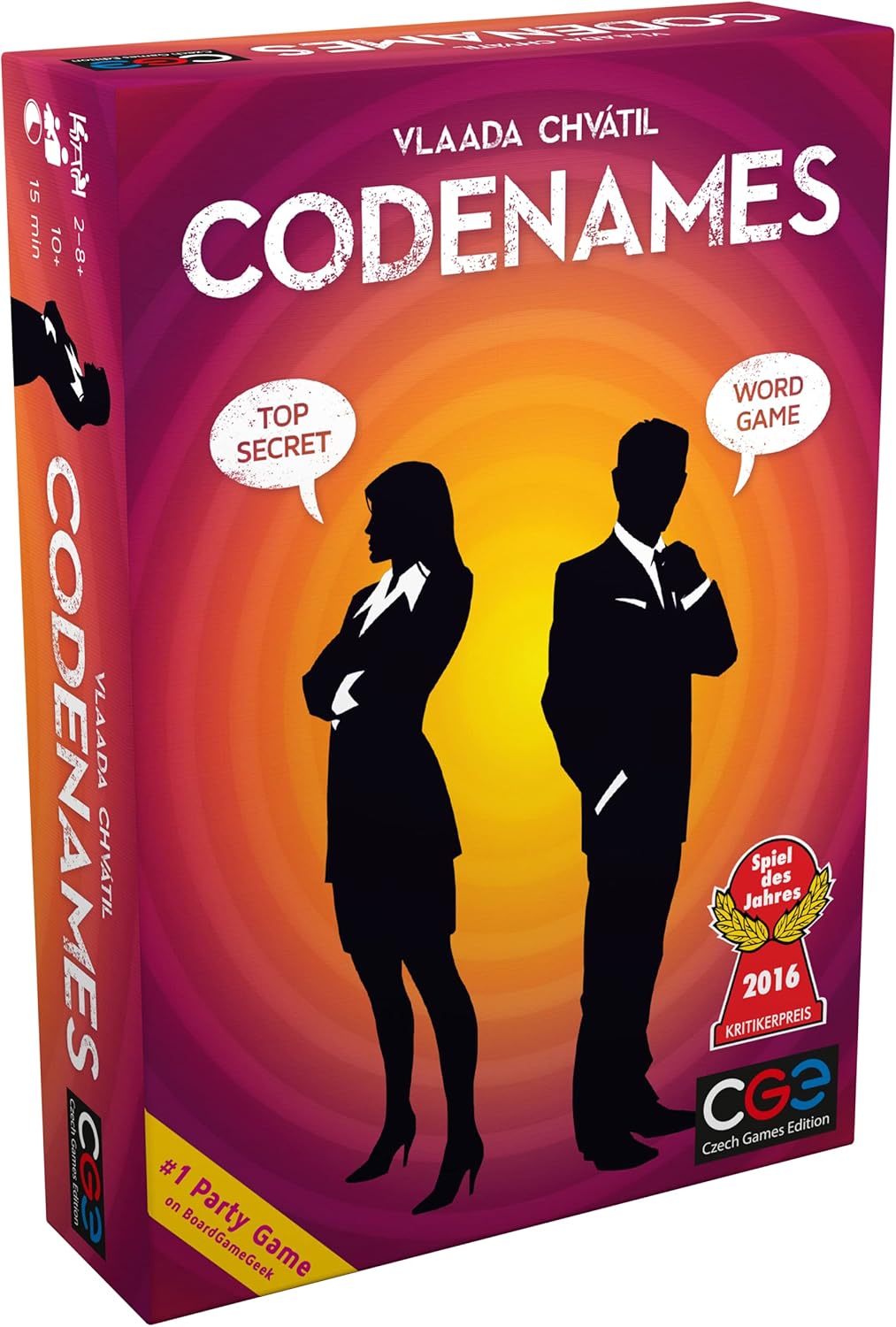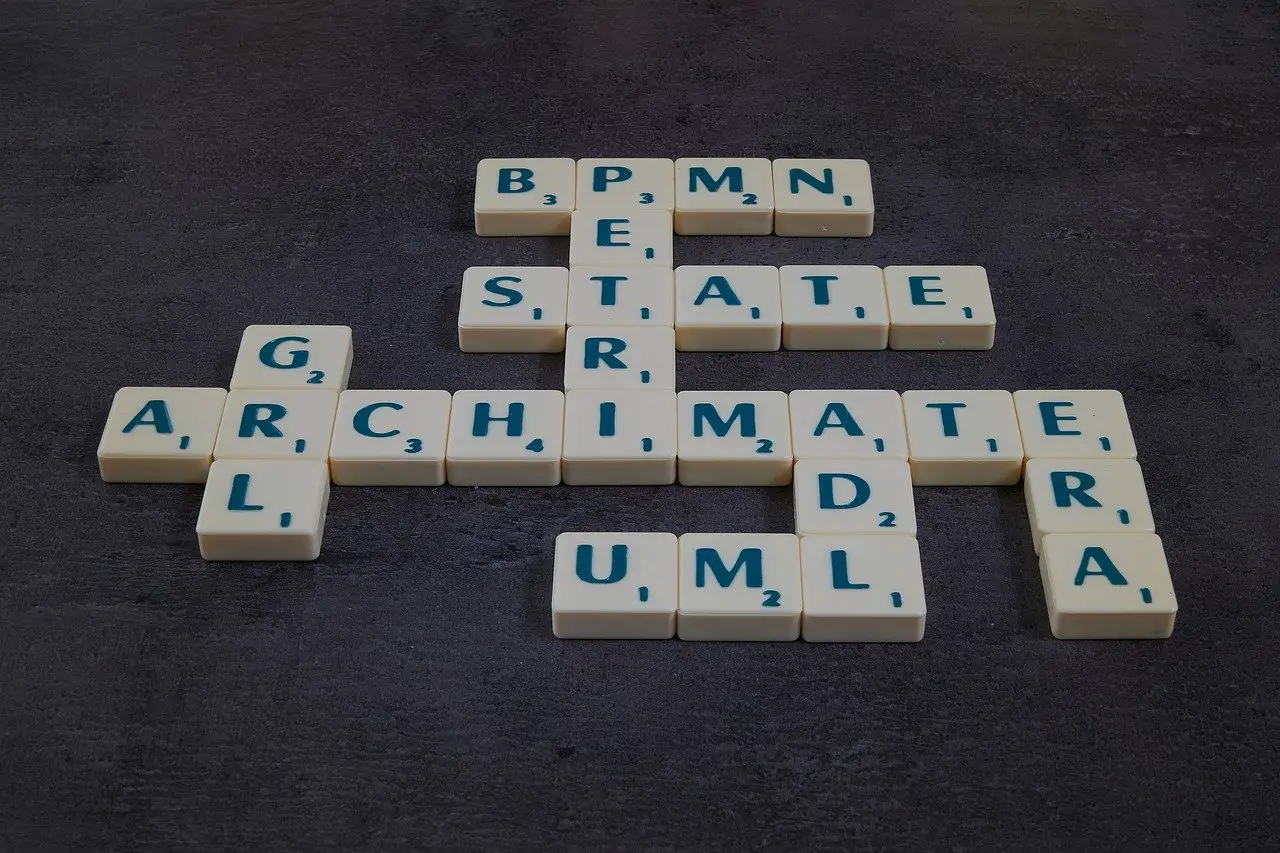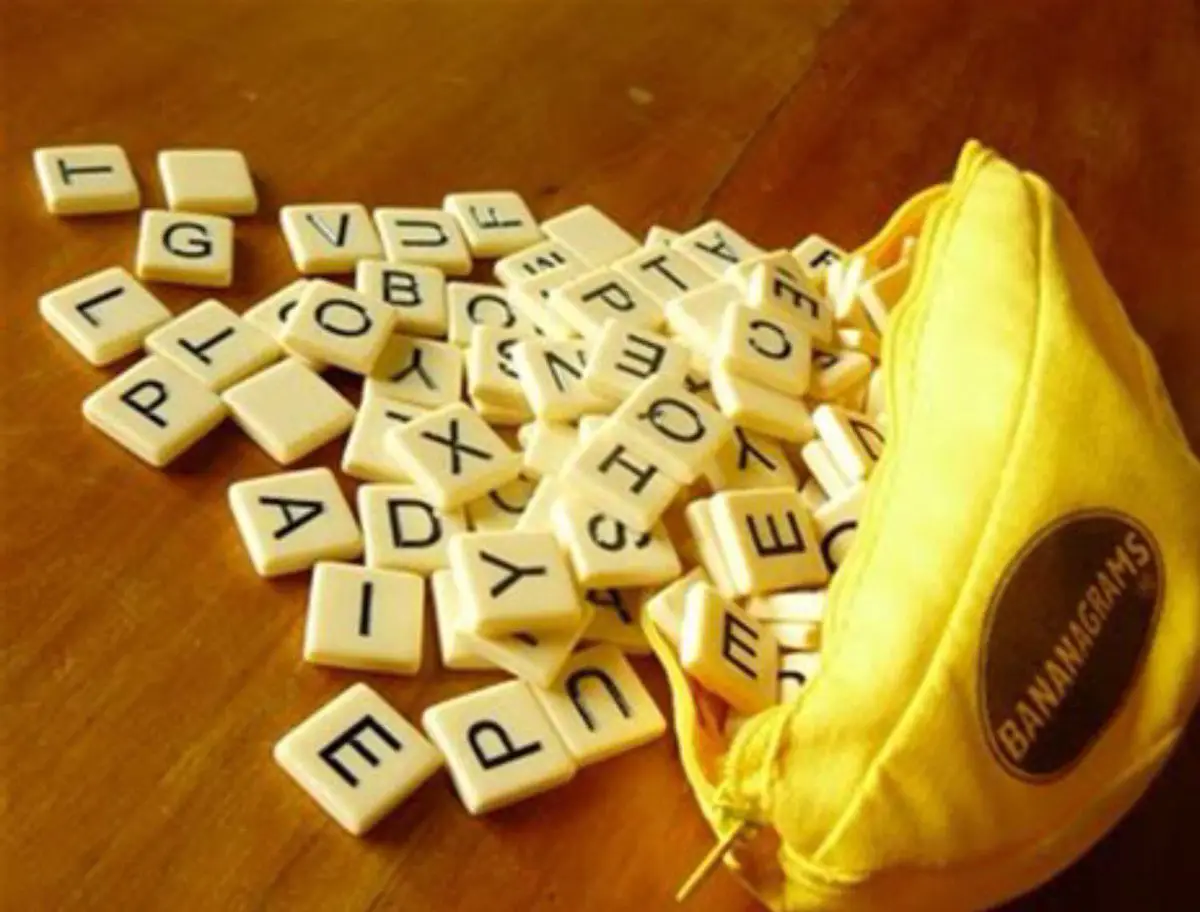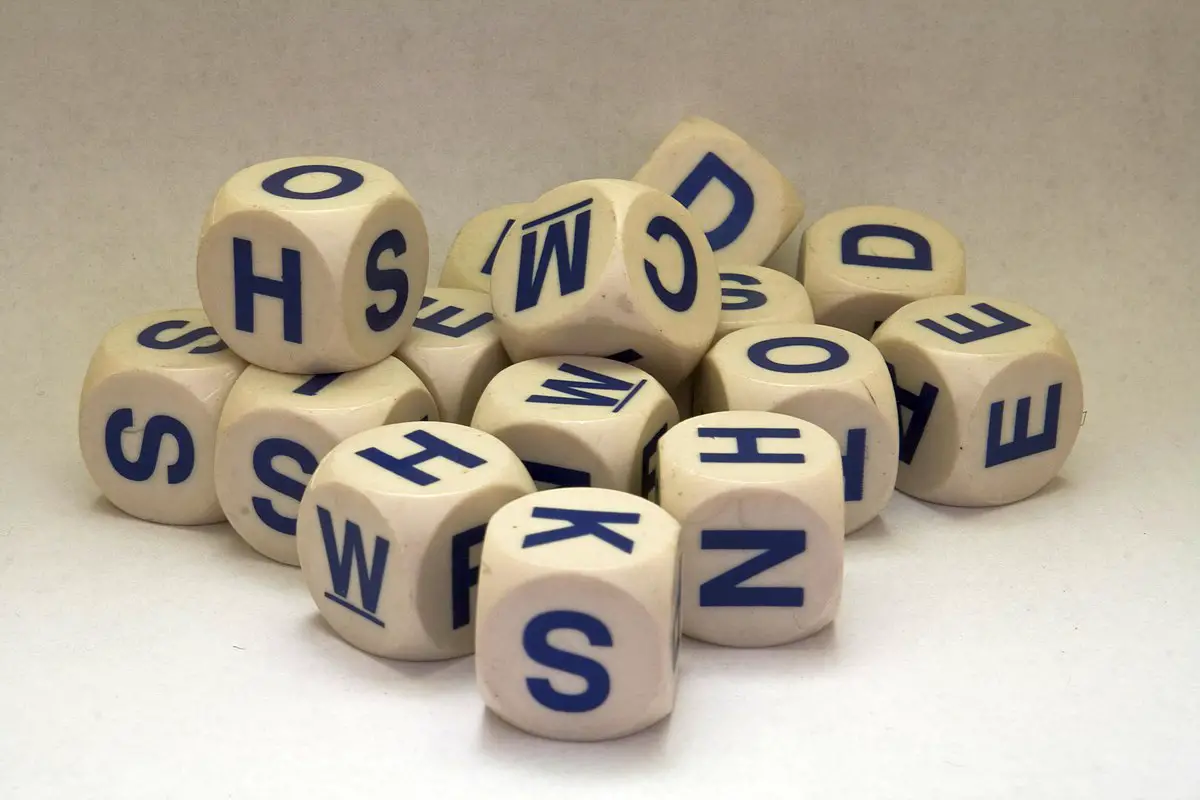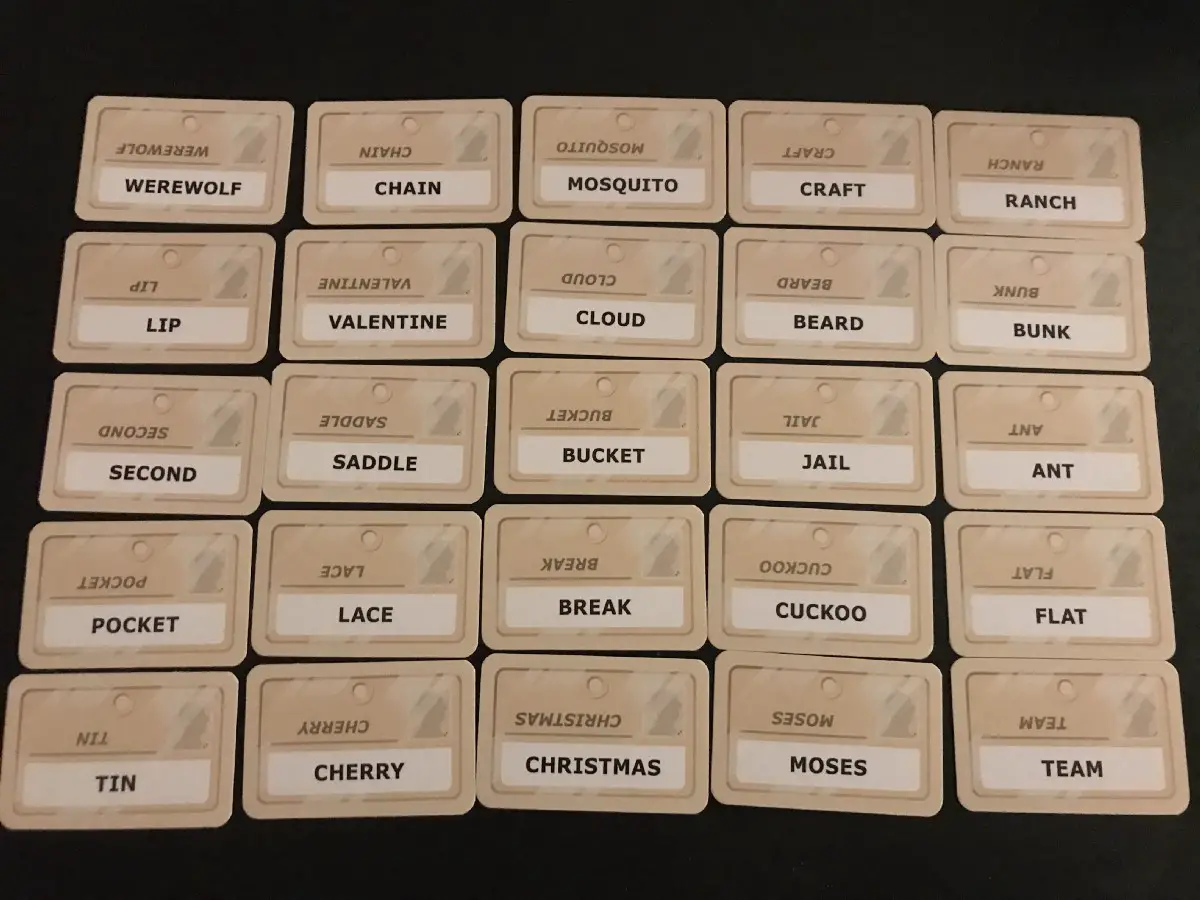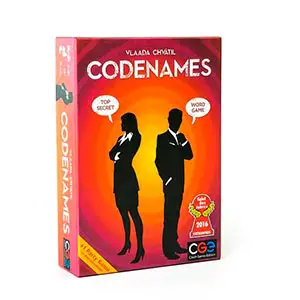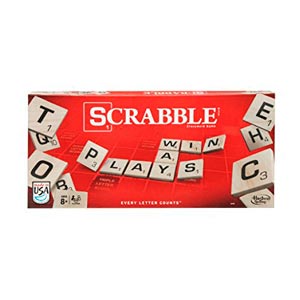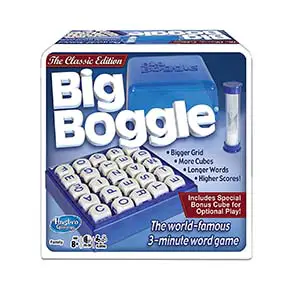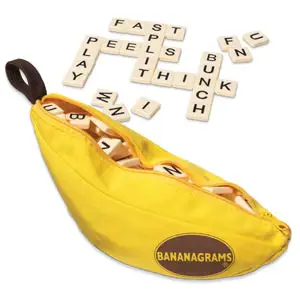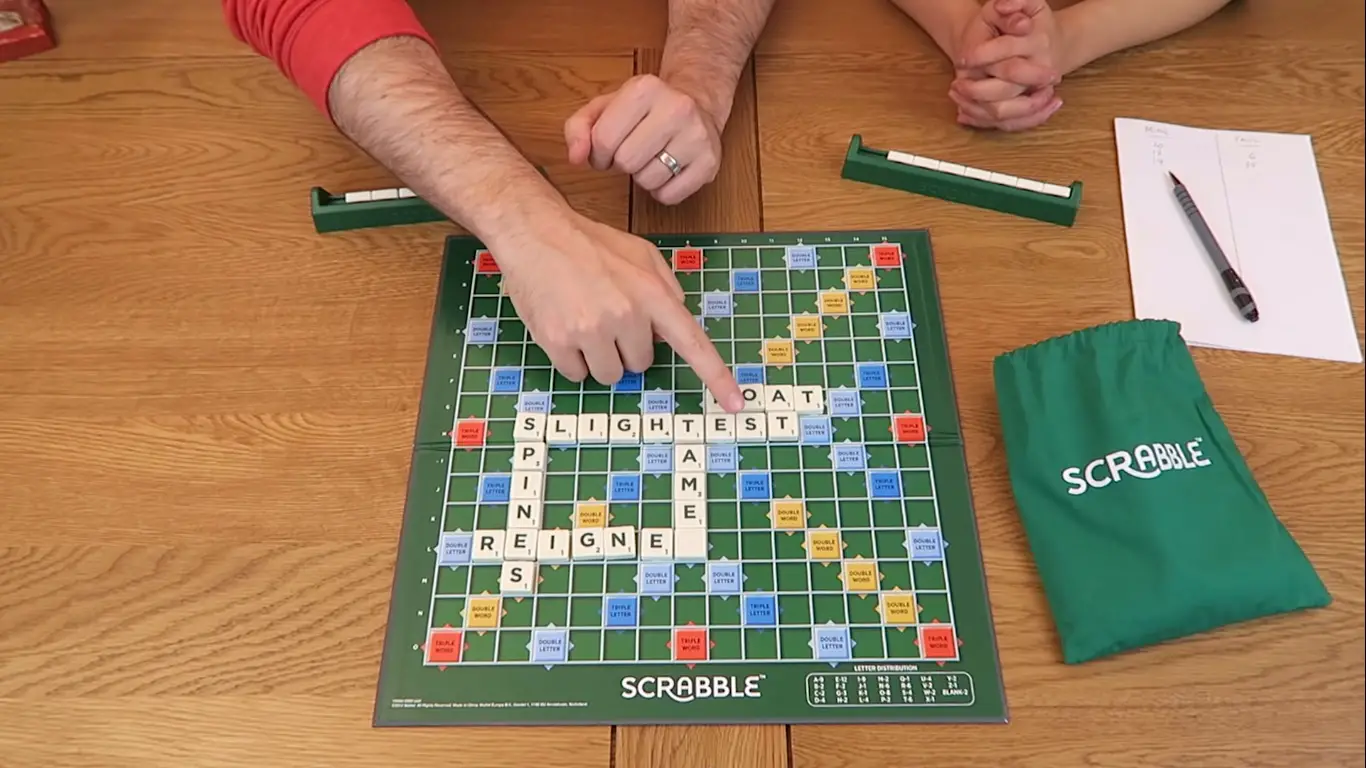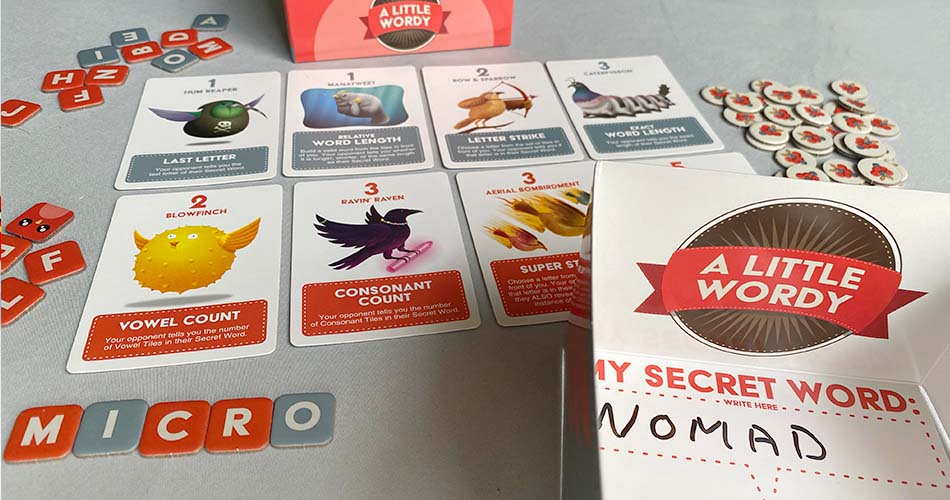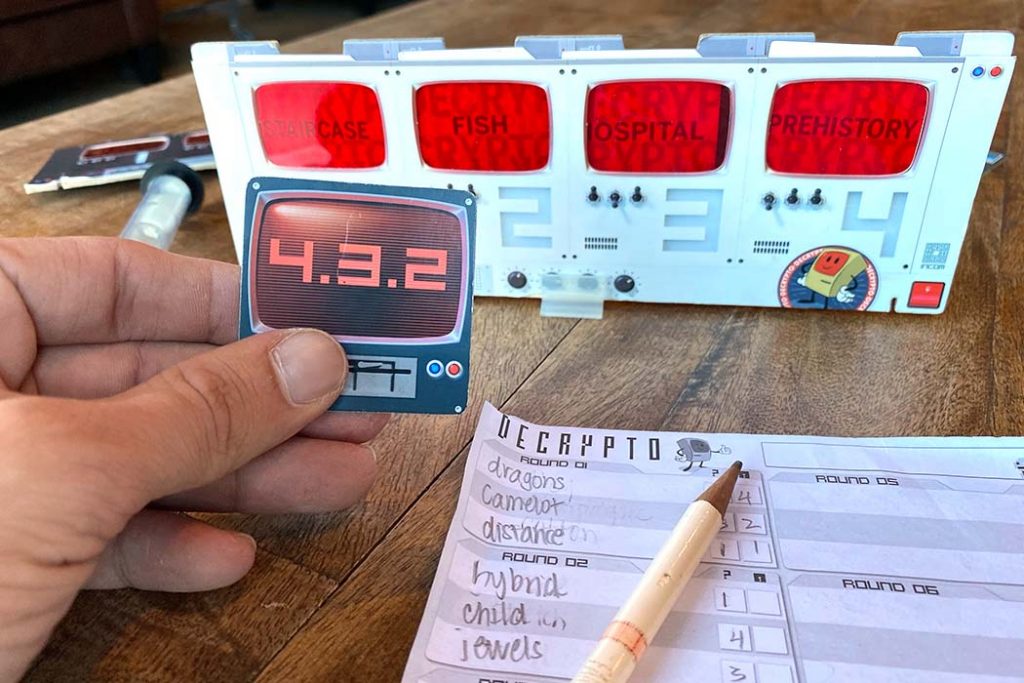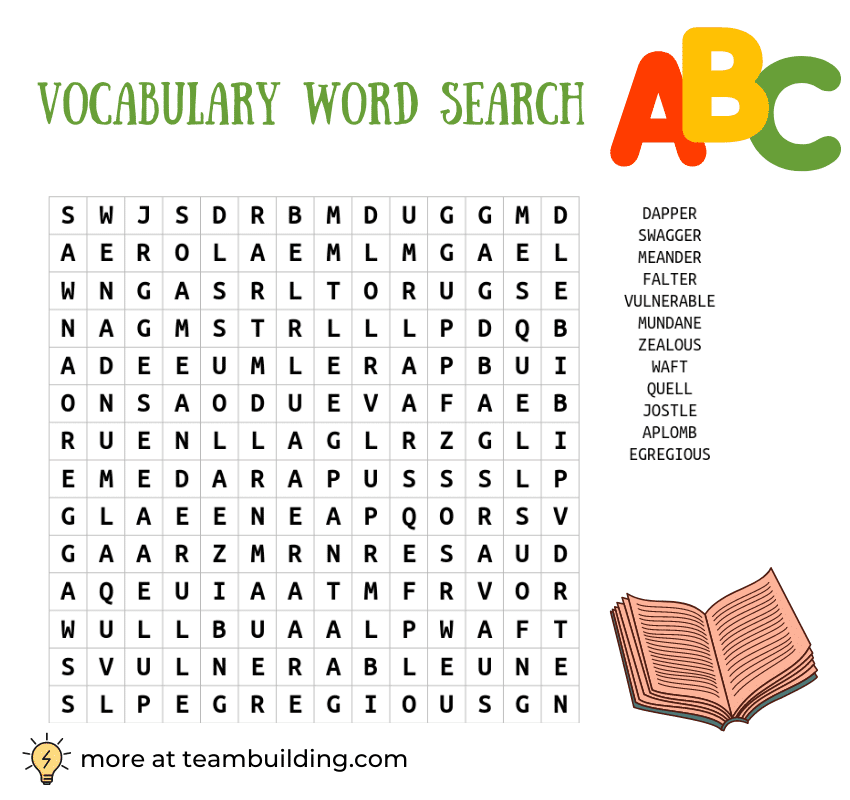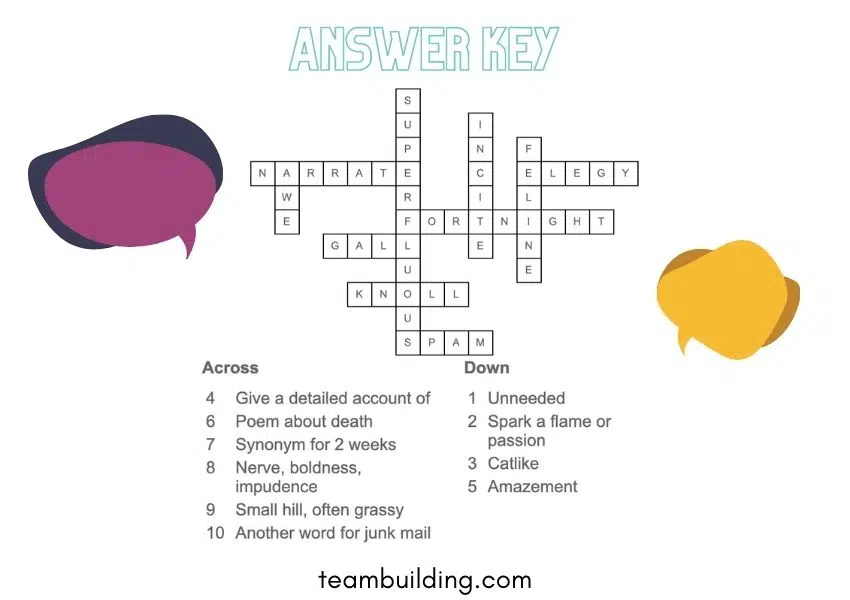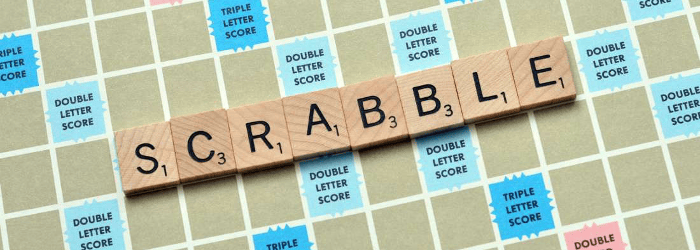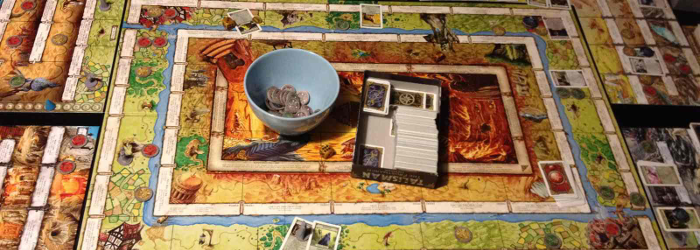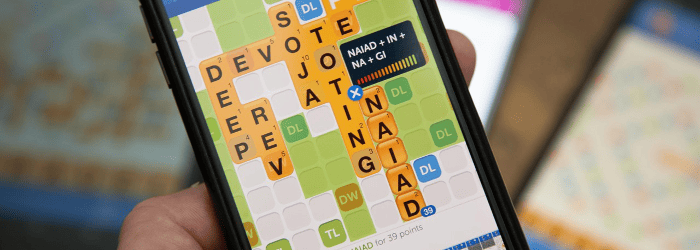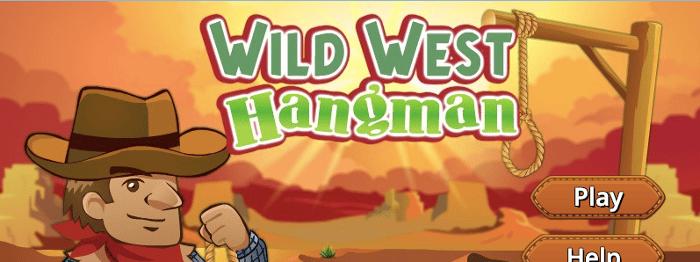There might be affiliate links on this page, which means we get a small commission of anything you buy. As an Amazon Associate we earn from qualifying purchases. Please do your own research before making any online purchase.
Are you a word geek
looking for new word board games to play?
Or are you simply
searching for something new to amuse you and your friends on game night?
Perhaps are you a parent
seeking games for your partner and kids that are both educational and entertaining?
If so, you have landed
on the right page! In this post, we share the 9 best word board games for you and the crew. We picked these games
based on the number of positive reviews and high ratings they got from
satisfied consumers.
Instead of mindlessly
scrolling through your social media accounts and wasting valuable time, it’s
probably time to consider other hobbies like playing board games. You’ll might
be surprised how much this activity can be beneficial to your soul, mind, and body.
Without further ado, let’s check out our list of the best word board games!
1. Bananagrams
Bananagrams is an excellent choice for parents who are looking to play
word board games with their children. In addition to fun and entertainment, this anagram game promises an
educational experience for kids, especially those who are starting to learn
more complex words.
The rules are simple and
easy to understand. First, you need to distribute the tiles among all players
(maximum of eight players) facedown—21 tiles each for two to four players; 15
tiles each for five to six players; and, 11 tiles each for seven to eight
players. Start the game by saying “Split!” and everyone turns their tiles over.
The objective of this
game is to be the first person to use all their letters. You may form words
horizontally from left to right, or vertically from top to bottom. You may also
rearrange your grid any time you want. After placing your last letter in your
grid, call out “Peel!” and everyone has to take another tile from the “Bunch.”
One rule to remember is
that you can put one of your letters back, face-down in the Bunch, by saying “Dump!”
However, you have to take three more tiles in exchange for that one letter. You
may do as many “dumps” as you like.
Whoever is the first
person to use all their letters once the Bunch is empty is the winner. But he
has to shout “Bananas!” to let the others know. The competitors should then
inspect his grid to see if there are misspelled words, proper nouns, or any
other unacceptable words. If there are, then they have to shout “Rotten
Banana!” to kick the false winner out of the game.
Pros
- Has fast-paced gameplay, and you can have as many rounds as you like.
- An excellent game for anyone, whether kids, teens, or adults.
- Suitable for multiple players or solo gaming.
Cons
- Choose your seller wisely, as fake sellers deliver tiles in poor conditions.
2. Quiddler
If you are looking for a fast-paced, short-duration word board game,
then Quiddler is the answer. This
game exercises both your vocabulary and spelling skills, and is most suitable
for children six years old and above. There can be 1 to 10 players, and the one
with the highest score at the end of the game is the winner.
In this game, each
player is required to create words from the cards in their hands. You have to
be cautious, however, since the number of cards increases every round. There
are eight rounds to deal with, and you can have as many as 10 cards on the last
round. Every card has its corresponding value, so if you have the most number
of words formed with high-value cards by the end of the game, you will have the
most number of points.
This word board game
allows you to form even the simplest of words like “at,” “of,” “zoo,” and a lot
more. This is why it is recommended to kids. There are bonuses, too. For
instance, the player with the most words formed and the player who forms the
longest word get additional points. In the case of a tie, no one receives the
bonus points.
Quiddler has a high
rating on online stores, with almost a perfect store, as well as lots of
positive feedback. If you are looking for a game you can play with your
children, then we highly recommend this one.
Pros
- Although designed to be fast, you can play the game at your own pace.
- Award-winning word board game; tried and tested by expert players.
- Makes a perfect gift for friends or family members who like word games.
Cons
- Some customers do not recommend the dictionary that comes with it.
3. Hasbro Scrabble
The game Scrabble was created
by Alfred Mosher Butts in 1938, and since then has became a popular way to
spend fun nights with friends, colleagues, and family members.
This particular version
of Scrabble is from Hasbro Gaming, which is one of the largest companies in the
world that makes toys and other means of entertainment. The goal of the game is
to form words on the board and gain points.
For every tile you use
to create a word, you have to draw a replacement from the bag. The game ends
once there are no more tiles, and the player with the most number of points
wins. To determine who has the most points, you’ll have to record your score on
each turn with pen and paper, and then add them up at the end.
Scrabble may be played
solo, with two to three players, or with a group of friends. You need a bit of
luck, as you have to draw tiles blindly, but the game also rewards those with
good strategy and extensive vocabularies.
Pros
- Traditional, classic board game; instructions may be found anywhere.
- Beneficial for small kids and older people for brain development and memory retention;
- Improves not just vocabulary, but also strategic and critical thinking.
Cons
- You must have outstanding vocabulary skills to win this game.
- Paper and pen are needed to record your scores.
4. Big Boggle
Big Boggle is an excellent choice for those seeking a word game with a
bit of pressure. The goal of
the game is to list as many words as you can from the randomly assorted letters
given to you at the start. However, you only have three minutes to do so, which
means you have to think and write quickly.
This board game comes with
25 standard letter cubes, one double letter cube, a cube grid with a dome, and
a three-minute sand timer. At the beginning of the game, each player takes a
pen/pencil and paper to list their words. The cube grid is then prepared by
shaking the cubes until they fall into place.
Once the timer starts,
all players should use the assorted letters and come up with words of four or
more letters. Write down every word you can think of until the time runs out.
Words must be formed from adjoining letters on the grid.
When the timer stops,
all players compare their lists of words with one another. All words that have
been played by multiple people are not scored. The remaining words are scored,
the one who earns the most points is the winner.
Pros
- Game mechanics are easy to learn and understand.
- Artwork and design are nice and pleasant.
- The element of time and pressure makes the game more exciting.
Cons
- Some word combinations are complicated for children (and even some adults).
5. Tapple
Tapple is a fast-paced word board game that is most suitable for
families who like playing games during holidays, parties, and family
gatherings. It is also easy to
store and carry, and therefore can be packed during vacations, trips, and long
getaways.
This board game comes
with a portable Tapple wheel and 36 topic cards with 144 categories. The goal
is simple: You have to produce an answer to the category cards using only the letters
available on the wheel. Aim to be the last player left in each round to get a
score, then collect three topic cards and you win.
Tapple is a
time-pressure and elimination game. You only have 10 seconds to answer every
round, and if you fail to do so, you get kicked out for that round. If you give
an answer that does not match the category, you get eliminated. The last person
standing gains the point and is declared the winner for that round.
Remember that when you
give your answer, you have to press the first letter of the word and then reset
the timer to pass the turn. Otherwise, you are disqualified. Likewise, keep in
mind that once a letter has been used, the others can no longer press that
letter for that round.
Pros
- Provides a fun and entertaining way for kids to learn new words.
- Equally exciting for adults and experienced players.
- An excellent word board game to give as a Christmas or birthday gift.
Cons
- Some customers report that the timer is too loud and annoying.
- Could have been better if there were a different tie-breaker.
6. Word on the Street
If you are searching for a very competitive word board game, then you
should include this one on your list. Word on the Street is a tug-of-words type of game where each team fights
for its desired letters to form high-scoring words. The first team to get the
eight letter tiles becomes the winner.
There are two teams in
this game, and they take turns “on the street,” or on the board. The letter
tiles are put in their corresponding place on the middle lane of the board
called the “Median Strip.” There are different rules with regard to turns, but
the main objective is to capture all eight letter tiles before the other team
does.
The key to winning this
game is to brainstorm with your teammates while the other team is making its
move. You all must agree on one word, and pull the letters of that word closer
to your side of the street before time runs out, and before the other team does
the same. Word on the Street is not just a vocabulary game, but also a game of
speed and strategy.
Pros
- Allows you to use more strategy than other word board games.
- The race element of the game makes it more fun and challenging.
- Builds camaraderie and teamwork among team members.
Cons
- Might not be fun enough for people in small groups (or if played alone or by two players).
- Rules might be too complicated for small children.
7. Pairs in Pears
Pairs in Pears is somewhat similar to Bananagrams, so if you are looking
for an alternative to the latter, then this word board game is a good fit. In this game, the goal is to make as many
pairs as possible, but they have to be matching suits.
The game comes with 104
tiles, and the number of tiles you can take depends on the number of players
there are. Similarly, the number of pairs needed to win also depends on the
number of players. There are, however, other ways to play this game, and they
are all explained in the game’s guide.
Pairs in Pears is a
racing and counting game in which you try to be the first to produce as many as
possible pairs with matching suits. It is a great way for children (and adults)
to improve their memory retention and cognitive skills, and is also a means to
develop pattern recognition and vocabulary.
Pros
- Fun and engaging, even for very young children.
- Game components are made of high-quality materials.
- Good game for mind stimulation, especially among children and older people.
Cons
- Some customers think that it is only best for two to three players.
- Others report that the rulebook needs to be more comprehensive.
8. Dabble
If you are a fast thinker and can come up with an answer in less than a
minute, then Dabble might be the word board game for you. This game tests not just your vocabulary skills,
but also your speed and agility.
The board game includes
all the letters of the Spanish and English alphabets, so it can be played in
both languages. It is appropriate for two to four players, ages 10 years old
and up, and you can even play it in teams.
The rules of the game
are simple. All players must pick 20 tiles from the bag without looking, and
then place their tiles face down. When the game starts, they all turn their
tiles and start the timer, then create five words (a two-letter word,
three-letter word, four-letter word, five-letter word, and six-letter word).
Points are recorded every round, and the first to reach 500 points is the
winner.
Other players may
challenge words if they have been misspelled or if they are not words at all.
You will need to have a dictionary on hand for challenges. Unlike Scrabble,
however, some words (e.g., foreign words, archaic words, colloquial words,
etc.) are accepted in Dabble.
Pros
- Greatly enhances your quick-thinking abilities.
- Challenging enough for both kids and adults.
- Available in two languages: English and Spanish.
Cons
- The game manufacturer could develop more rules to add excitement.
9. Upwords
Upwords is a great game
if you are searching for a high-stacking, word-building game. In this game, you
don’t just think of words to form, but you also stack tiles to change words.
Your score is not based solely on the number of words you form, but also on the
level of tiles you stack—the higher you stack, the higher your score is.
Similar to Scrabble, the
game begins by each player drawing seven tiles from the bag. The first player
starts the game by placing a word on the board, and then drawing new tiles from
the bag. Every player who comes next forms a word by adding letters to the
previous tiles on the board.
Unlike Scrabble,
however, you can place your letters on top of the other letters that are
already on the board. For instance, if the word is “HAT,” you can use the
letters T, R, E, S, and S to add to the end of the word, and then cover H with
M to form the word “MATTRESS.”
There are a few other rules
to consider in this game that are not in Scrabble. One example is the points
system, as Upwords’ letter tiles all have one point each. There are also no
double or triple letter word scores for additional points.
If you are looking for a
Scrabble-like game with a bit of a twist, you might want to consider checking
out this game.
Pros
- Game mechanics are easy to learn and understand.
- Similar to Scrabble, with a bit of twist.
- Offers intense, strategic, unique wordplay.
Cons
- Could have been better if the scoring were more interesting.
- Choose your seller wisely, as fake sellers deliver low-quality games.
Final Thoughts on Word and Vocabulary Board Games
We highly recommend
these word board games for those who are looking for a bit of fun and a great
way to help their children learn. After all, these types of games have shown to
be beneficial for a person’s brain development and cognitive skills. And while
your children are learning and having fun, you get to be a part of their
experience.
We also suggest these
games for those who have gotten tired of playing the usual mystery, roleplaying, and deck-building board games. You might want to try changing the flavor of
your game night and see how well you do in other types of board games.
Whatever your reason is
for checking out this post, we hope that we were able to help you find a game
that suits your tastes.
Have you already tried
playing one or more of these board games?
Let us know which one by
sharing your story in the comment fields below. We’d love to hear about your
experience!
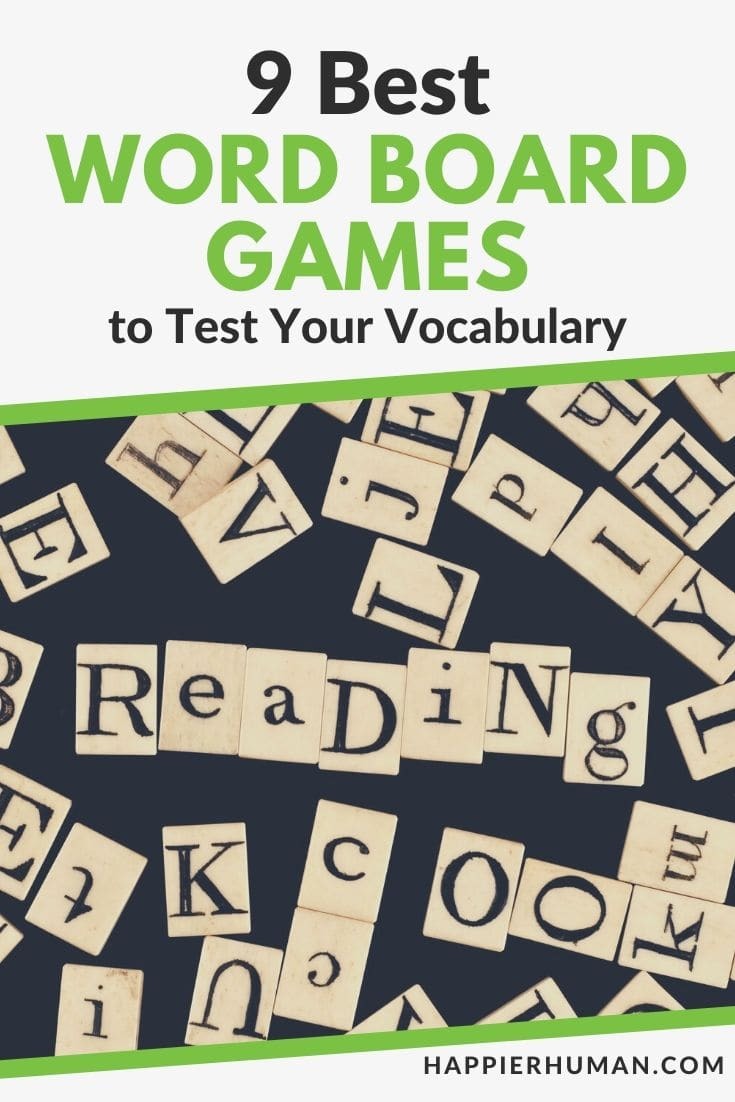
If you’re a wordsmith, a word-wiz, or just enjoy a little wordplay, these word board games are right up your vocabulary alley. Word board games can be used as an educational tool, as a hilarious party game, or simply as a way to keep your wordy wits about you. If you’re not into word games, don’t fret, word unscrambling tools can give you an assist in any word game while improving your vocabulary.
So on-words and up-words, here are our top 20 best word board games!
Like Word Games? Why not also check out our list of Puzzle Games and Trivia Games that keep you mentally active, while still having fun?
🏆 Our Top Picks for Best Word Board Games
In a hurry? Take a quick peek before you go.
Best Team
4.0
Best Quick
3.8
Best Overall
4.2
04/11/2023 05:30 pm GMT
When I Dream
Players: 4-10
Playing time: 20-40 min
Put on your sleep masks and try to decipher your dreams!
When we fall asleep and enter a dream world, the imagination and imagery can be truly magical. When I Dream turns players into dreamers. Be careful when entering the magical world of dreams because the Dream Spirits want to have fun!
When I Dream is an innovative game that puts a focus on creativity and player imagination. Put on your sleep mask and try to interpret the Dream Spirits messages. With fairies, naughty spirits, and even the Boogeyman, the game has an array of characters that make it challenging and that give the game depth.
This is an excellent fast-paced party game that’ll have you storytelling before the Boogeyman wreaks havoc!
What we liked
When I Dream offers some new unique mechanics that give the word game genre something to think about. Combine that with the gorgeous artwork and you get a really pretty and fun game.
What could be better
With the timer included, it can rapidly descend into chaos.
Werewords
Players: 4-10
Playing time: 10 min
Guess the magic word!
In Werewords, players must guess a secret word by asking ‘yes’ or ‘no’ questions. Be careful, time catches up to you! Like in most games, there’s always a villain looming and trying to interrupt play. In Werewords, one player is secretly a werewolf.
Not only is this player working against you, but they also know the Magic Word. Even if you don’t guess the word in time, you still have the chance of exposing the werewolf and winning the game!
What’s cool about this word game is that it comes with an iOS/Android app that’ll provide thousands of words in hundreds of categories giving the game-high replayability.
What we liked
It’s like One Night Ultimate Werewolf but combined with a word game. It’s a weird combination that seems to work very well.
What could be better
Like the original Werewolf, Werewords suffers from similar role management. There are only a handful of roles that are really fun to play, but most players end up as villagers.
Will you figure out the word or will the werewolf get you? Better get your top wordsmith on the case.
Trapwords
Players: 4-8
Playing time: 30-45 min
You know the secret word your teammates must guess. You’ll give clues to help but the other team has other plans in mind. They’ve set a list of ‘trapwords’. You can’t say them or you’ll end up trapped in dungeons with terrifying monsters. Easy enough? Oh, there’s also a time limit.
Trap words is a fast-paced party game that seems like a simple task of giving clues but gets more challenging by not knowing which words can be said.
If you’re looking for a word game with a fantasy theme, Trapwords takes you into the fantasy world of dungeons and monsters.
What we liked
Trapwords is a fun fantasy variation of Taboo. The rules are changed enough to make it more interesting to play than Taboo.
What could be better
The timer can be tricky, especially for younger players.
Decrypto
Players: 3-8
Playing time: 15-45 min
Decrypto has a fun vintage aesthetic, surely making it a favorite among the hipster community. But really, this word game blends decoding and player interaction through interesting mechanics.
In this game, teammates try to transmit secret codes without letting the opposing team intercept them. Using clever graphic anaglyph components, players slide cards into the screens to decode the words.
The communication limits make Decrypto a fun and challenging word game to play, plus you’ll feel like a code breaker sending secret messages.
What we liked
The option to guess the other team’s words and clues adds another level to a fun word game.
What could be better
I’m not sure why, but I had trouble with Decrypto’s rules. It took me far longer than it should have to understand everything and teach it to my gaming group. It could have just been me, but it did give me trouble.
Letter Jam
Players: 2–6
Playing time: 45 min
Your friend gives the clue. Can you guess your secret letter?
Letter Jam is a cooperative word game where players work together to compose meaningful words from letters around the table. But the twist is only the other players can see your letter cards, not you.
Letter Jam combines team-based play and players’ deduction skills. Pull together as a team, find the clues, and reap the fruits of cooperation!
Jam out at the next game night and decipher the codes!
What we liked
Under its simple exterior, Letter Jam offers a cerebral word game that delivers more gameplay the longer you play.
What could be better
It’s played best with more players and is all but obsolete at 2-players.
Bananagrams
Players: 1-8
Playing time: 15 mins
A fun game for everyone that’ll drive you bananas.
Gather your friends and family and race against each other to build crossword grids. Bananagrams is an educational and entertaining game with which you can teach kids how to spell words all while having fun at the same time.
In Bananagrams, players have to build their words with letters as fast as they possibly can. A race to finish, speed, and a great vocabulary make the game super exciting.
What we liked
The game is in a case that’s shaped like an actual banana, making it a great travel game. It can fit in any bag and it comes in a cute package. What’s not to like?
What could be better
If you have trouble with words then the real-time movements and actions can be tricky to deal with.
Blank Slate
Players: 3-8
Playing time: 20-35 min
The game where great minds think alike.
Blank Slate is a game of predictions. “The game where great _ _ _ _ _ think alike!” Easy to learn and quick to play makes Blank Slate a fun game for all levels.
By picking a word cue card, you’ll write which word you think best completes a phrase. To take this a step further, you’ll have to try to match it to another player’s words.
In this clever party game, prediction skills are key to matching words. If you get good enough you’ll soon be winning the _ _ _ _!
What we liked
Blank Slate is a simple and very fast-playing word game. It works very well as an icebreaker and introduction for people who just met.
What could be better
Your enjoyment of Blank Slate is going to highly depend on who you are playing with.
Codenames
Players: 2-8
Playing time: 15 min
‘The top-secret word game. Win or lose, it’s fun to figure out the clues!’
There are good reasons why Codenames has become a staple on board gamers’ shelves. Codenames is a deceptively awesome game that’s easy to learn and perfect for parties.
Codenames is a social word game in which two rival spymasters know 25 secret agents. Their teams only know agents by codenames. Make contact with all your agents first and win. Although this game can be challenging, the social component keeps everyone entertained as they race to finish first.
This is a fun game when you’re winning, but even better when you’re losing.
What we liked
Codenames is quick, easy to learn, and a blast. There’s a reason it’s become a go-to game in so many households.
What could be better
There’s a lot of hype surrounding Codenames. There are numerous games out there that do the same thing, Codenames just does it really well. If you’re looking for something innovative and unique, you’ll be disappointed.
More versions of Codenames
Poetry for Neanderthals
Players: 2-12
Playing time: 15 min
A word game where you must ‘speak good’ or get hit with a stick.
Poetry for Neandertals is a competitive word-guessing game. Players are only allowed to use single-syllable words to give clues to their team to guess the phrase.
For example, the word is broccoli, you’ll have to say something like, ‘green food, live long’. Use a big word, you’ll get hit on the head with a 2-foot-long inflatable club.
From the geniuses that brought us Exploding Kittens, Poetry for Neandertals is another fun addition to a game night. With only 15 minutes to play, this hilarious, challenging, cutthroat game tests the patience of logophiles the world over.
What we liked
If you’re a fan of The Oatmeal webcomic, you’re going to love the artwork and irreverent humor. It’s just as ridiculous and fun as it looks.
What could be better
The humor is a bit low-brow. If you’re not comfortable speaking oddly and smacking friends over the head, then this is probably going to be a miss.
Just One
Players: 3-7
Playing time: 20 min
A cooperative party game where you’ll have to work together to discover the mystery words!
Just One starts with one player drawing a card and choosing a number from it. Each player gets one clue word and together you’ll try to solve the mystery word. Just One is a brilliant word game as it combines cooperative skills with deduction, memory, and creative thinking.
What we liked
I really like the mechanic that discards identical clues. This forces you to be strategic and creative with your clues. Easy-to-learn and easy to play make Just One a relaxed game for everyone.
What could be better
Just One is great, but it can feel as if turns take forever and that’s not good for a party game.
Punderdome
Players: 3- 99
Playing time: 30-90 min
A card game for the pun lovers among us.
Punderdome will have you laughing out loud with its punny cards and creative style of play.
Once a pun a time, the creators of Punderdome saw a space in the word game market for a pun game for family and friends. With pun jokes on the back of each card, you can entertain the crowds while waiting to come up with a pun. Some can take longer than others but you can play with no time limits.
If you’re a pun lover, this is a punderful card game that you won’t regret purchasing.
What we liked
Unlike many of the other games on this list, Punderdome offers quite a lot of opportunities for creativity. It lets you create something instead of just showing off your knowledge of vocabulary.
What could be better
It’s a game about puns. You’re going to be groaning and laughing, but if you’re not well-versed in puns and dad jokes, it may be a little dry.
Quiddler
Players: 1-8
Playing time: 30 min
Quiddler: Simply for the fun of words.
Quiddler is a short word game that’s a great pick for word lovers as well as non-word-game players. With this card game, the goal is to arrange your cards in your hand to create one or more words.
If you deal more cards, you’ll have more opportunities to create words. At the end of the game, the highest score wins.
Quiddler is a sort of Uno-style word game as some cards can double letters and add bonuses to your points. Sharpening your word skills and a bit of luck will have you winning Quiddler!
What we liked
Quiddler makes for a great travel game. It’s simple enough that anyone can play and it’s so easy to pull it out and play wherever you are.
What could be better
Quiddler relies on luck of the draw to get letters. If you have an extensive vocabulary you can overcome bad draws, but it’s still luck-based.
Hot Words
Players: 4-16
Playing time: 20-30 min
Hot Words is a party game where you can’t say that.
In Hot Words, you’ll describe words while your team tries to guess what the word is. In each of the 4 rounds, your team will pick a spicy jalapeño card that has a ‘Hot Word’ on it that you can’t say.
As each round goes by, it’ll get hotter and harder but also more hilarious trying to avoid all the ‘Hot Words’ your team has accumulated.
What we liked
Hot Words provides a simple concept and puts it together in a nice little package. It’s a wordplay game that has a ton of replayability.
With fun added elements like a ghost pepper round, a 90-second sand timer, a dinner bell, and little hot sauce bottles, Hot Words is a fun and exciting party game!
What could be better
If you’re looking for a smaller group game, Hot Words is best played as a party game with more players.
Can you handle the heat?
Dabble
Players: 2-4
Playing time: 30-60 min
The game where if you can spell, you can play!
Dabble is a fast word game that’s both educational and fun. To start the game you say ‘GO!’ and players race to spell 5 words using 20 tiles. The first person to spell their word wins!
What we liked
The added difficulty of making multiple words of varying sizes seems like a simple concept but definitely makes Dabble stand out.
What could be better
Like a lot of word games, if you have someone who memorizes vocabulary words in their free time, they’ll absolutely destroy everyone. It’s best to play with people of the same skill and vocabulary level.
Word a Round
Players: 2
Playing time: 20 min
Race to unravel the word!
Word a Round is a challenging word game where you’ll have to quickly figure out where the word starts and then read it aloud before your opponent. As you answer on the spot, the game becomes a little more difficult as you race to answer. Mistakes are made under pressure so players have to have their wits about them.
Word a Round is an award-winning card game that’s a great educational tool in classrooms or at home. It helps develop critical thinking skills, making it a favorite among speech therapists. If you are looking for a fun game that’ll also help with learning, this is a great choice.
What we liked
Word a Round can be learned in seconds and it’s one of the most unique word games on this list.
What could be better
Since this requires you to guess at words around a circular card, it can be difficult for people with visual impairments.
Word on the Street
Players: 2-10
Playing time: 20 min
A hilarious tug of words.
Word on the Street is a card game in which players take turns flipping category cards, racing the clock to come up with the answer. With each correct answer, you move closer to the sidewalk… and to safety.
With 432 different categories, there is huge variation and replayability. This game is particularly focused on being educational. It helps players improve their vocabulary, practice spelling, and develop social skills.
What we liked
Word on the Street is a simple enough word game but combines wordplay with enough strategy to make it unique.
What could be better
You’ll need to have quick recall of your vocabulary, so if you’re looking for a slow burn game then this is not what you’re looking for.
Wordplay: Family Edition
Players: 2
If your family loves word games, WordPlay is a fast-paced challenge in which everyone plays every round.
A fun spinner determines the letters and the category for each round. For example, ‘Food and Drinks’ means you can only use words that begin with the letter ‘E’. The difference with this family edition is even if you think of things that don’t start with the correct letter, you still score some points.
This game is a friendly and inclusive way to help kids learn and be introduced to the wonderful world of word board games.
What we liked
Wordplay is a simple word game that appeals to everyone. It’s simple enough that anyone can pick it up and have some fun right out of the box.
What could be better
Wordplay’s universal appeal means that there’s no real innovation or new mechanics. It’s fun, but you’ve seen it before and will see it again in other word games.
Upwords
Players: 1-4
Playing time: 90 min
Upwords a game of quick stacking and word hacking.
In this word-building game, the higher you stack, the higher your score. With each player starting out with 7 words that you can play up or down, the game almost feels like Scrabble.
But here, you can stack letters on top of others. When you stack letters higher on each other, you earn more points. This makes Upwords more intense and strategic.
Upwords is very versatile and can be played solo to challenge yourself, with kids, or with your friends. Experience this high-stakes, high-stacking word game, and grow your vocabulary as you go!
What we liked
I honestly prefer Upwords over Scrabble. The tile stacking adds a whole new dimension to the classic wordplay formula.
What could be better
It’s a minor issue, but I’m not a fan of the components on the deluxe board. They work fine, but the color scheme makes it difficult to see for me.
Wordical
Players: 2-8
The radical, dice-rolling, word-building race!
Wordical is another educational word game in which players roll a vowel die and combine consonants to make a word. It’s a fun way for kids to develop their spelling skills and build vocabulary. It’s easy to learn and moves quickly so there are no long pauses.
This is a wonderful game for the classroom or for students who are struggling with their phonics.
What we liked
The dice add an interesting twist to this word game. Randomness is usually added through other means, but it’s a refreshing take on the word game genre.
What could be better
It’s a simple travel game, so the rules and gameplay are very simple. You won’t find in-depth strategy here, but that’s ok for a word game.
Wordsmithery
Players: 2- 99
Playing time: 20 min
The game for every wordsmith, young and old.
Wordsmithery is a fun, fast-paced game in which you can test your wordsmith skills. Draw a word, read it to your opponent, and see if they can guess the meaning from the three options.
With some difficult words like ‘egregious’ or ‘phalanx’, it could seem difficult for children but included are 50 easier cards for kids. The different levels of difficulty make this a family-friendly word board game.
What we liked
The concept is extremely easy to understand and the word choices are genuinely fun to play with.
What could be better
Eventually, you’re going to memorize all of the words available in the box. There are only so many times you can be surprised by a word before we simply learn it.
Wrap-Up
What are your favorite word games to play? We hope you enjoyed our top picks for the best word board games out there! Let us know in the comments if you’ve tried any of these or if we missed any that you think should be on the list. We’d love to hear from you!
Happy Wordsmithing!
Kendra has always been a hardcore fantasy nerd. Growing up in the worlds of Tolkien, Sanderson, Jordan, and Abercrombie, DnD & board games just came naturally. She and her husband, Bryan, started GameCows.com in 2018 as a fun passion project that just took over their lives. An avid board gamer since childhood and chronic DnD chronicler for more than two decades, she loves to play, write, travel, and learn dead languages.
There is a reason why word games are so popular: they’re fun! Why not mix in some competitive action and play one of the best word board games to help you get your mind off of things. Whether you want something quick or you have time for an epic game, there’s a game out there for everyone. Let us introduce you to the world of word board games with our complete guide to these addicting pastimes.
Best Choice
Codenames Red
Best For Adults
Codenames Red is perfect for adults who are looking for a challenging game. With its complex rules and numerous pieces, it’s sure to keep you entertained for hours on end.
Check Price
Word Board Games Buyer’s Guide
Just like anything else, when it comes to word board games, there are a lot of different options available on the market. How do you know which one is right for you? We’ve put together this handy buyer’s guide to help make your decision easier.
First and foremost, consider what type of game you want. Are you more interested in strategy, wordplay, and vocabulary? Do you enjoy a good party game with friends and family where everyone is involved from beginning to end? Maybe you prefer the solo experience of crosswords. There are games for all types here, so take your time finding one that fits what you’re looking for!
Another thing to consider is the difficulty level of the game. Some are geared towards beginners, while others can be quite challenging for more experienced players.
If you’re new to word board games, we recommend starting with something a bit easier so that you can learn the rules and gameplay without being too frustrated. However, if you’re looking for a real brain teaser, there are definitely games out there that will fit the bill!
Why Does Size Matter?
When it comes to word board games, size definitely matters! The table or surface area that you have available is a big factor in what type of game you will want. For example, if there are just two of you playing and your play space isn’t too big, something small like Crossword Solitaire will work great. On the other hand, if you have a big group and plenty of room to spread out, there are some really fun games that involve tossing or flicking pieces.
In addition to size, consider what type of storage space you have available when selecting your game. If it’s going in a closet between uses, something super lightweight will work great whereas if you want to take it with you on trips, a game that’s easy to transport is ideal.
Finally, think about how much time you want to spend playing. Some games can be completed in just a few minutes, while others can last for hours on end. If you don’t have a lot of free time, choose a game that you can fit into your schedule easily.
Why Does Weight Matter?
Just like size, weight matters when it comes to word board games! Heavier games tend to last longer and are a bit more challenging. If you’re looking for something that will keep you entertained for a while, we recommend choosing one of the heavier options. However, if you want something that you can play quickly without getting too frustrated, a lighter game might be better for you.
Keep in mind that games with smaller pieces tend to weigh less than those with larger pieces. So if you’re looking for something compact and easy to take with you on the go, choose a game with small pieces. Conversely, if weight isn’t an issue and you want a really challenging game to play with friends, go for something with large pieces.
Why Does Material Matter?
Just like size and weight, material matters when it comes to word board games! Games that are made of plastic or other lightweight materials are easy to transport and store. However, they can often be less durable than those made of heavier materials. If you’re looking for a game that will last for years, we recommend choosing one with a sturdier material.
In addition, games that are made of wood or metal tend to be heavier than those made of plastic. So if you’re looking for a game that will keep you entertained for a while, we recommend choosing one of the heavier options. However, if weight isn’t an issue and you want something that’s easy to transport, a game that’s made of plastic might be better for you.
Finally, think about how the material will affect gameplay. For example, if the pieces in your game are made of heavy material, they may be more difficult to move around than those made of lightweight material. Likewise, if the material is smooth, the pieces may slide around a lot when you’re playing.
What About Colors?
When it comes to colors, there isn’t really a right or wrong answer. However, we do recommend choosing a game that has bright and vibrant colors. This way, you’ll be able to see the pieces easily even if the light is low. In addition, games with interesting patterns or designs can be more visually appealing than those with solid colors.
If you’re looking for a game that will be fun for the whole family, we recommend choosing one with lots of different colors. This way, everyone can easily see their pieces and play quickly and efficiently.
Finally, if you have trouble seeing certain colors, choose a game that has high contrast between the colors. For example, black letters on a yellow background are easier to see than those with black letters on white.
Best Word Board Games: Comparison Table
Now that you know all about the different factors to consider when choosing a word board game, it’s time for our comparison table! This will help you easily see which games fit your needs best.
| Image | Product | |
|---|---|---|
|
Best For Adults |
Codenames Red
Check Price |
Check Price |
|
Best For Families |
Scrabble
Check Price |
Check Price |
|
Best For Solo Play |
Just One
Check Price |
Check Price |
|
Best For Groups |
Big Boggle
Check Price |
Check Price |
|
Best For Trivia Lovers |
Bananagrams
Check Price |
Check Price |
1. Codenames Red – Best For Adults
Codenames Red is perfect for adults who are looking for a challenging game. With its complex rules and numerous pieces, it’s sure to keep you entertained for hours on end. In addition, the red theme will appeal to fans of espionage movies and thrillers. And the game has lots of vibrant colors that will keep you interested even after many hours of play.
Codenames Red is also great for families looking to bond with their kids over a fun and engaging word board game. This way, everyone can learn new words while having fun together! Plus it”s compact enough to go on family trips and camping trips.
Codenames Red is made of metal, which means it’s heavier than most other games on this list and won’t be as easy to transport or store. And the pieces are small enough that kids may struggle with some aspects of gameplay (though not too difficult for them to play). Plus, some people may not like the red theme.
Codenames is a great word board game for adults looking for something with complex rules and lots of pieces. In addition, it’s fun for families who are interested in playing together!
Pros And Cons
Complex rules
Lots of pieces
Great for adults and families
Vibrant colors
Final Thoughts
When it comes to word board games, Codenames Red is one of the best options available. With its complex rules and numerous pieces, it’s sure to keep you entertained for hours on end. And the vibrant colors will keep you interested even after many hours of play. So if you’re looking for a game that will challenge your skills, Codenames Red is perfect for you!
Result
4.8
If you’re an adult looking for a word board game with complex rules and lots of pieces, Codenames Red is a perfect choice! And if you want something that will be fun for your whole family to play together, this one may also fit your needs. However, it’s heavy so transporting or storing it might pose a problem, and the pieces are small so kids may have some difficulty playing. Finally, the red theme might not be for everyone.
2. Scrabble – Best For Families
Scrabble is another great game for families who are interested in playing together. It has vibrant colors and an easy-to-transport design, so it’s perfect for vacations or camping trips! Not only that, but the tiles have very high contrast which makes them easy to see even if you don’t have good eyesight or struggle with certain colors.
Finally, this word board game is perfect for adults who don’t like too much luck in their games. With Scrabble, you must carefully choose your words and place them on the board as strategically as possible to win! So if you want a strategic word board game that challenges not only your vocabulary but also your strategic skills, Scrabble is a perfect choice.
However, there are a few downsides to consider. For one, the game can be quite long if both players are equally matched. And it also requires a lot of table space, so you might not be able to play it in certain locations.
Scrabble is an excellent word board game for families and adults who don’t like too much luck in their games. In addition, it has a compact design which makes it great for family vacations or camping trips! However, the long-playing time might not be ideal for some people and may require more room than what certain locations offer.
Pros And Cons
High contrast tiles
Easy to transport/store
Requires more room than other word board games on this list
Challenges your vocabulary and strategic skills
Final Thoughts
When it comes to word board games, Scrabble is an excellent choice. Not only does it have vibrant colors and a compact design which makes it perfect for vacations or camping trips, but the game also challenges your vocabulary and strategic skills! So if you’re looking for something that offers more than just great graphics, this one may be for you.
However, the long-playing time and more room required than other games on this list may not be ideal for everyone. If that’s the case, there are plenty of different word board games out there which will suit your needs just as well!
Result
4.5
If you want a word board game that is perfect for families and adults who don’t like too much luck, Scrabble is a great option! It has vibrant colors, an easy-to-transport design, and high contrast tiles which make it perfect for people with poor eyesight.
3. Just One – Best For Solo Play
Just One is a word board game that is perfect for solo play. With its simple rules and easy-to-remember gameplay, you can be up and playing in no time! And the best part? This game can be played by people of all ages and skill levels. So if you’re looking for a game that will challenge your skills, but also be friendly to those who are less experienced with games like these, Just One is a perfect choice!
But there are some downsides as well. The game’s simplicity means that it lacks the level of strategic play other word board games have. And because you can only choose one letter at a time and the game only has one move per turn, it can get a bit boring after a while.
Just One is an excellent choice for those who want a simple word board game they can play by themselves. With its simple rules and easy-to-remember gameplay, you can be up and playing in no time! However, the game’s lack of strategic play may not be ideal for some people who want something that is more challenging than Just One.
Pros And Cons
Easy to learn and play
Great when you don’t have a lot of time to spare
Perfect for solo play
Suitable for people of all skill levels and ages
Final Thoughts
When it comes to word board games, Just One is a great choice. Not only does the game offer high contrast tiles and easy-to-follow rules which makes it perfect for people with poor eyesight and those who don’t want anything too challenging, but its simplicity also means that you can be up and playing in no time!
But if you want something with more strategic play or are looking for a word board game that is suitable for people of all ages and skill levels, this one might not be the right choice.
Result
4.5
Just One is an excellent choice for those who want a word board game that offers high contrast tiles and easy-to-follow rules. With its simple gameplay, you can be up and playing in no time! However, the lack of strategic play may not be ideal for some people who are looking for something more challenging than Just One.
4. Big Boggle – Best For Groups
Big Boggle is a word board game that’s perfect for groups. With its large, colorful cubes and easy-to-follow gameplay, this one will have everyone entertained from the moment they sit down to play! And with so many different ways to play Big Boggle, you can enjoy it again and again without getting bored.
But, because you have to use dice when playing Big Boggle, the game can be quite random. If you’re looking for something that will challenge your vocabulary skills and strategic thinking abilities more than luck, this one may not be the best choice.
However, if you are just looking for an excuse to spend time with friends and family, Big Boggle is a great option! With its large, colorful cubes and easy-to-follow gameplay, this one will have everyone entertained from the moment they sit down to play! And with so many different ways to play Big Boggle, you can enjoy it again and again without getting bored.
Pros And Cons
Large, colorful cubes
Easy-to-follow gameplay for all skill levels
Fun for groups of all ages
Many different ways to play
Final Thoughts
If you’re looking for a word board game that will challenge your skills but isn’t too challenging or complicated to learn and play, Big Boggle may be the perfect solution. With its large, colorful cubes and easy-to-follow gameplay, this one is great for anyone who wants an excuse to spend time with friends and family.
However, the game’s randomness does mean that there is less of a chance to show off how well you know words if luck plays too much of a factor in your gameplay.
Result
4.5
Big Boggle is great for groups who are looking for an excuse to spend time together and have fun! With its large, colorful cubes and easy-to-follow gameplay, this one will have everyone entertained from the moment they sit down to play! And with so many different ways to play Big Boggle, you can enjoy it again and again without getting bored.
5. Bananagrams – Best For Trivia Lovers
Bananagrams is a word board game that’s perfect for trivia lovers. With its simple gameplay and fast-paced nature, this one will have you hooked from the moment it starts! And with so many different ways to play Bananagrams, there’ll be something new for anyone who loves challenging themselves with word puzzles.
However, because Bananagrams is so fast-paced, it can be easy to make mistakes. If you’re looking for a game that will test your vocabulary skills and strategic thinking abilities more than your ability to race against the clock, this one may not be the best choice.
But if you love trivia and want a word board game that is simple to learn and play, Bananagrams is the perfect option! With its simple gameplay and fast-paced nature, this one will have you hooked from the moment it starts! And with so many different ways to play Bananagrams, there’ll be something new for anyone who loves challenging themselves with word puzzles.
Pros And Cons
Suitable for all ages
Simple gameplay for all skill levels
Fast-paced and easy to learn, which is great if you love trivia
Many different ways to play
Can be easy to make mistakes
Final Thoughts
If you love trivia and are looking for a word board game that is simple to learn, Bananagrams may be a perfect choice. With its simple gameplay and fast-paced nature, this one is great for anyone who wants to enjoy a challenging word board game without getting too bogged down in rules or complicated gameplay.
Result
4.8
If you’re looking for a word board game that will test your vocabulary skills and strategic thinking abilities more than your ability to race against the clock, Bananagrams may not be your best option.
People Also Ask
What is the best word board game for two players?
If you’re looking for a word board game that can be enjoyed by two players, we recommend Scrabble. With its simple gameplay and easy-to-follow rules, this one will have you hooked from the moment it starts! And with so many different ways to play Scrabble, you’ll be able to challenge yourself every time!
What is the best word board game with a timer?
If you’re looking for affordable word board games that come with their own countdown timer, Bananagrams may be your perfect match. With this one, there are no extra pieces required, and it’s great for anyone who wants to enjoy a challenging word board game without getting too bogged down in rules or complicated gameplay.
What is the best word board game for kids?
If you’re looking for a word board game that is perfect for children, we recommend Big Boggle. With its large, colorful cubes and easy-to-follow gameplay, this one will have your little ones entertained from the moment they sit down to play! And with so many different ways to play Big Boggle, they can enjoy it again and again without getting bored.
What is the best word board game for adults?
If you’re looking for a word board game that is perfect for adults, we recommend Bananagrams. With its simple gameplay and fast-paced nature, this one will have you hooked from the moment it starts! And with so many different ways to play Bananagrams, there’ll be something new for anyone who loves challenging themselves with word puzzles.
What is the best word board game for family night?
If you’re looking for a word board game that is perfect for family night, we recommend Scrabble. With its simple gameplay and easy-to-follow rules, this one will have your whole family entertained from the moment it starts! And with so many different ways to play Scrabble, you can enjoy it again and again without getting bored.
Conclusion
Word board games are a great way to test your vocabulary skills and strategic thinking abilities. With so many different options available, there is sure to be a game that is perfect for you! In this article, we have recommended our top five-word board games and provided a brief overview of each one. We hope you enjoy playing them as much as we do!
Word board games can be a lot of fun for many and educational for the children – and not just for the word-loving logophile or crossword solving experts out there.
Let’s take a look at some of the best Word Board Games on the market, from the simple to the hard (Einstein level – not quite) and the popular, and not so common.
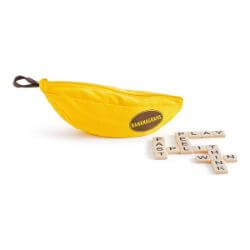
Bananagrams
For the word buffs and crossword lovers the Bananagrams word game is a good tabletop option to consider – especially for families with children learning.
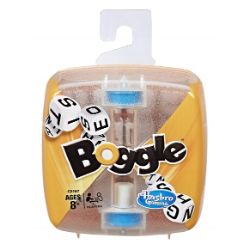
Boggle
Boggle is an excellent word game option that has its own unique aspects of play which includes shaking and rolling a whole bunch of dice with 3 minutes to spare.
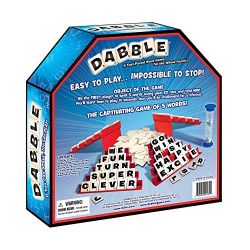
Dabble
Dabble is fast paced and requires some quick thinking as your time is out in 5 minutes. Play will last anything from 30 – 60 minutes usually.
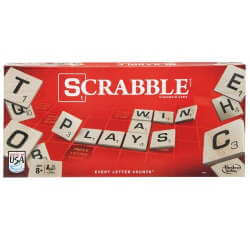
Scrabble
Mention word games and most of us instantly think of the board game Scrabble. A household favorite and classic.
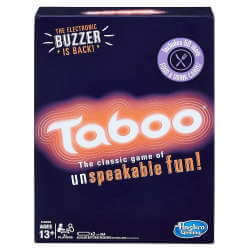
Taboo
Some things are just forbidden and unsaid, which brings me to Taboo that’s cool game for groups which lacks in seriousness.
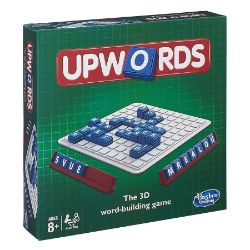
Upwords
Upwords board game is a lot like Scrabble with a couple or so cool differences. The main variance being the 3D stacking up.
Here is our list of the 10 best word games. This category of board games is pretty self-explanatory. These are games that typically do not have any focus on the theme and are all about words, things that benefit from you being everything from a master of language to a logical genius. You may have to build or you may need to deconstruct but there are many things that you can do with words while playing with our knowledge and preconceived notions of language and communication. With all the amazing games in this category in mind, here is your list of the 10 Best word games.
OTHER ARTICLES LIKE THIS: 10 Best Board Games Based on Books | 10 Best Abstract Strategy Board Games | 10 Best Horror Board Games | 10 Best Board Games About Trees
#10 | Trapwords
Trapwords makes the list of the best word games because it is a party game that has successfully blended some great mechanics from the past into a wonderful modern game for any medium or large sized group. It is like the classic Taboo, but it takes it further by having the opposing team choose the words you cannot use and you do not know what they are.
You take the role of a group of adventurers crawling through a fantasy dungeon full of traps and curses, with a Boss waiting for you at the end. You have to successfully guess a word that one of your teammates is trying to describe to you. And the further you get, the worse it gets. For 4 – 8 players, games run about 30 – 45 minutes.
FOR MORE: Buy Trapwords on Amazon on Amazon
#09 | A Little Wordy
A Little Wordy makes the list of the best word games because it brings the genre in an intriguing direction that just works, especially for the 2 player showdown it is built for. This game, from the creator of Exploding Kittens, brings together word-forming and deduction. You need to form a smart word but then you need to use interesting pieces of information to guess your opponent’s word before they do the same to you.
Write it down, keep it a secret. Rescramble your tiles, pass them to your opponent. The goal is to examine your opponent’s tiles and try to figure out their word. You do this with Clue Cards. These tell you things such as: what’s the first letter, how long’s the word, or what does it rhyme with? You win by using as FEW of these clue cards as possible to figure out what word your opponent wrote down. For 2 players, games run 5 – 15 minutes.
FOR MORE: A Little Wordy Page | How To Play A Little Wordy | A Little Wordy Review | Games Like A Little Wordy | Buy A Little Wordy on Amazon
#08 | Letter Jam
Letter Jam makes the list of the best word games because even though it is very new, people are falling in love at an alarming rate. From the same publishers as Codenames, Letter Jam is a cooperative word game where players assist each other in composing meaningful words from letters around the table. It has fun communication and it tests an appropriate level of knowledge if you like a game about working together with others instead of against.
At the start of the game, each player receives a set of face-down letter cards that can be arranged to form an existing word (players selecting words for each other). Throughout the game, other players search each other’s cards to make words. Ultimately you are trying to use clues to figure out your master secret word and the more players that successfully do, the better the victory. For 2 – 6 players, games go for about 45 minutes.
FOR MORE: How To Play Letter Jam | Games Like Letter Jam | Buy Letter Jam on Amazon
#07 | When I Dream
If you are looking for something that does have a lot of theme and a lot of additional things going on, When I am Dream may be the title on the list of the best word games for you. This is a real-time deduction game that has elements of storytelling and role-playing. If you strip it all away, however, this is a word game at heart.
This is an active game so get ready. The dream spirits want to have some fun tonight. Players each take turns being the “dreamer” and they “fall asleep by putting on a cloth mask (included). The other players are secretly dealt their role cards determining if they have naughty or nice intensions. A non-dreamer draws an image card and has to describe it in one word. Lighting round style, you have 120 seconds to get through as many as possible. For 4 – 10 players, games last 20 – 40 minutes.
FOR MORE: Buy When I Dream on Amazon
#06 | Wordoku
Wordoku makes the list of the best word games because it is a simple concept that blends some things you know and love to make for a great word building experience that any fan of the genre will love. Wordoku makes for an edge of your seat quickfire challenge that meshes classic mechanics incredibly well.
This game is a combination crossword-sudoku word game where players race to create words and earn points using wooden letter tiles on a 4×4 grid, while skillfully incorporating all the tile symbols to double word values. The game is played over three rounds in which players earn awards for scoring the highest number of points — and for improving their personal high scores between rounds. For 1 – 6 players, games run 20 – 30 minutes.
FOR MORE: Wordoku Page | How To Play Wordoku | Wordoku Review | Games Like Wordoku | Buy Wordoku on Amazon
#05 | Werewords
Werewords makes the list of the best word games because it takes a great word game and throws in a wolf, literally and metaphorically. It is a great deduction word game, taking in clues to get you closer, but it also happens to have this other random hurdle that is going to pop out and ruin days. It is a lively title and should please players of all groups and intensities.
Players guess a secret word by asking “yes” or “no” questions. Figure out the magic word before time is up, and you win. The wrench, however, one of the players is secretly a werewolf who is not only working against you, but also knows the word. If you don’t guess the word in time, you can still win by identifying the werewolf! It is very difficult to hide as the werewolf. For 4 – 10 players, it goes about 10 minutes per round.
FOR MORE: Buy Werewords on Amazon
#04 | Decrypto
Decrypto makes the list of the best word games because it is a masterful blending of a guessing game within a bigger guessing game. You have your own thing going on with your team, but depending on how well you do at that informs the bigger race of which overall team is going to team. You need people to guess from a shortlist of words, how little can you give them to get them there is the question.
Players compete in two teams in Decrypto (white and black), with each trying to correctly interpret the coded messages of their opponent before they do the same. On each team’s personal board, there are four cards tucked into the different screens (#’d 1 – 4). The team can see these words, the opponents cannot. Each round one team member per team is the decoder and draws a card with a series of numbers (relating to the 1 – 4). They have to get their team to guess this order by giving clues, but then you are also giving clues to your opponent. For 3 – 8 players, games run 15 – 45 minutes.
FOR MORE: Games Like Decrypto | Buy Decrypto on Amazon
#03 | Just One
Just One is the only board game in this genre to ever win a Spiel des Jahres award which alone justifies its existence on the list of the best word games, but it is also pretty fantastic. Just One is a cooperative party game in which you play together to discover as many mystery words as possible.
Players take turns having to guess a word. Before they do, the card with the word is revealed to the other players and they need to write down a clue to help them get there. It can be anything, but the hook is that duplicate clues get removed. It is more difficult than you think. The goal is to get a score as close to 13 as possible. For 3 – 7 players, games run about 20 minutes each.
FOR MORE: Just One Page | How To Play Just One | Games Like Just One | Buy Just One on Amazon
#02 | Scrabble
Scrabble breezes onto the list of the best words game because it is one of those untouchable games that continue to get the respect it deserves. Scrabble came out in 1948, is one of the most well-known board games in human history and is still played today because it is the best at what it does.
You start by drawing 7 letter tiles. Players use these to form words on the gameboard. Each word laid out earns points based on the commonality of the letters used, with certain board spaces giving bonuses. But a word can only be played if it uses at least one already-played tile or adds to an already-played word. The high score wins, simple but devastating. For 2 – 4 players, games run about 90 minutes.
FOR MORE: Games Like Scrabble | Buy Scrabble on Amazon
#01 | Codenames
Some people may be upset about Codenames taking the top spot on the list of the best word games over Scrabble, but we will say it, Codenames is that amazing. It almost seems like an accident how well communication flows and layers of difficultly and scenarios unfold themselves as you play. No discredit to the designer, it just all comes together so unbelievably beautiful that it doesn’t seem possible to construct such a thing.
The group is split into two teams. You are spies and you need to get your fellow operatives out of the field before your opponent does the same. This is represented by a grid of many words that secretly each have a blue operative, red operative, bystander or evil assassin under them. Each round, one member from each team gets to look at a decoder card showing all the locations and they need to communicate this to their team by giving 1-word answers. The key is that you need to give clues that apply to multiple spots to win. For 2 – 8 players, games run about 15 minutes per round.
FOR MORE: Codenames Page | How To Play Codenames: Pictures | Codenames: Pictures Review | Games Like Codenames | Buy Codenames on Amazon
OTHER ARTICLES LIKE THIS: 10 Best Board Games Based on Books | 10 Best Abstract Strategy Board Games | 10 Best Horror Board Games | 10 Best Board Games About Trees
Do you agree with this list of the best word games!? Leave your thoughts in the comments below or on our BGH Facebook Page.
You found our list of fun and simple vocabulary games for adults.
Vocabulary games are activities that include language and wordplay. Example games include Word Association and Hang Man. Players can enjoy vocabulary games in person or online. The purpose of these games is to strengthen vocabulary skills. These games are also known as “vocab games”, “letter games” and “vocabulary building games.”
These games make great online classroom activities and communication games, and can be used as online fun activities for employees.
This list includes:
- vocabulary games for adults
- simple vocabulary word games for adults
- fun online vocabulary games and activities
- English vocabulary games
- vocabulary games in English
- games to improve vocabulary
- vocabulary building activities
- vocab review games
- vocabulary games for students
Get ready to play!
List of vocabulary games
From Pictionary to word scrambles to synonym memory, here is a list of fun word games to play in classrooms, at parties, or during meetings.
1. Vocabulary Pictionary
Pictionary is a game of charades where players draw words instead of acting them out.
To play:
- Split the group into teams.
- Each round, assign one team member to draw.
- Give the drawing team member a word.
- Allow up to sixty seconds for teammates to guess.
- If the team guesses correctly, then assign one point.
You can give other teams the opportunity to steal, or move onto the next team’s turn. The game is a great way to practice new vocabulary, as players connect the word with an image. Pictionary is a fun game for virtual parties or in-person affairs.
To play Pictionary online, draw on the whiteboard app feature on your online meeting software.
2. Word Association
Word Association is one of the best vocabulary games for kids and classrooms since playing does not require a large vocabulary. The rules are simple and easy to understand. Typically, the game involves two players.
To play:
- Player one says a word.
- Player two responds with the first word that comes to mind.
- Player one either chooses a new word or responds to player two’s word.
- The game continues until one player repeats a word or pauses too long.
The rapid pace of the game generates excitement and occasionally results in funny answers.
If a student makes a mistake, then the teacher can pause the game and ask the student to explain or find a more fitting word. Ideally, gamemasters should allow players a few extra seconds to respond. Players should never feel embarrassed. There are no wrong answers in word association, but the game can serve as a learning opportunity to find better words.
If playing via Zoom, then player one or the teacher speaks a word, and other students answer in the chat. The class counts up matching answers and discusses different responses, guessing the reasoning behind each answer.
3. Vocabulary Hangman
Hangman is a classic chalkboard word game that translates easily to online play, thanks to digital whiteboards.
To play:
- Assign a player a word.
- The player draws a series of blanks corresponding to the number of letters in the word.
- Other players guess letters.
- If the letter is in the word, then the “executioner” fills in the blank. If not, then the executioner draws one portion of the gallows.
- The game ends when players guess the word, or when the picture is complete.
The best words to use for hangman contain less-used letters like z, x, and q. Examples of hard hangman words include zigzagging, razzmatazz, and quadrants.
4. Word search
Word searches are common classroom vocabulary games. These activities work well for handouts, and you can play during video calls by using the whiteboard feature and enabling annotation.
We made a sample word search you can use.
To make the game more competitive and exciting, turn the challenge into a race and award prizes to the first players to complete the puzzles.
5. Crossword
Crossword puzzles consist of a series of interconnecting boxes, each of which starts blank but contains one letter by the end of the game. Under the puzzle are two lists of clues, across and down respectively. Solvers need to consider the meaning of words, number of letters, and surrounding words, making the game strategic as well as literary.
Here is an example of a crossword puzzle you can use with your class or team.
Here is the answer key.
Crosswords are great word games for any age or skill level because puzzle makers can adjust the difficulty to suit players. To make your own crossword puzzle, use an online crossword creator.
6. Word Scramble
Word scrambles make great games for English class, and adults enjoy these language brain teasers as well. Simply mix up the order of the letters and ask players to unscramble and identify the original words.
Here is a sample to start with.
And here is the answer key.
To make your own word scrambles, use an online letter randomizer.
7. Scrabble
Scrabble is one of the most popular word games for adults or children. Players must use letter tiles to assemble words on the game board.
To play:
- Each player draws seven letter tiles.
- During turns, players can play tiles or exchange them for new letters.
- Players build words on the board, with each new word connecting to an existing word.
- Tiles have a point value assigned depending on the challenge of the letter. When a player makes a word, tally the letter and add the score to the point board.
More challenging letters have higher point values. For example, E is one point, while Z is ten. To find the point values for each tile and read more gameplay tips, check out this guide from Hasbro.
To coordinate the game for language lessons, assign higher scores for vocabulary words, and ask players to use the words in a sentence for extra points.
Scrabble is easy to play online, too, making it one of the best online vocabulary games. To play virtually, simply find a multiplayer online version of the game, such as Words With Friends.
8. Scattergories
Scattergories is one of the most fun and simple word games for adults. The game challenges players to think up words all starting with the same letter.
To play:
- One player rolls a letter die or uses a letter generator to pick the first letter.
- The timekeeper puts 60 seconds on the clock.
- Players write down one answer per category starting with the letter.
- When time runs out, players read the answers.
- Players receive a point for every answer.
Alliterative phrases count for double or triple points. If two players have the same answer, then they must cross it out and neither receives points. Of course, a player will not receive points for blank answers either. At the end of each round, the player with the most points wins.
Here is a list of sample Scattergories categories:
- A boy’s name, girl’s name, or gender neutral name
- Capital cities
- Four letter words
- Types of drinks
- Holidays
- Careers or professions
- Cartoon characters
- Websites
- Desserts
You could create more inventive categories for the game, or challenge players to make up prompts.
To play virtually, use the chat, screen-share, whiteboard functions in your virtual meeting platform. You can also share a Google Doc or Form, or join a multiplayer online Scattergories game together.
9. Tree or Bob Ross
Tree or Bob Ross is a fun video conference game that challenges players to guess a word by asking questions.
The player who conjures the word is The Post. The Post answers This or That questions whose answers help players narrow down the word.
The first question of the game is usually “is it more like a tree, or more like Bob Ross?” and The Post must answer accordingly. For instance, a rose is probably more like a tree, but Pinnochio presents an interesting challenge.
Each turn, the guesser adds a new word. For example, the second question might be, “is it more like a tree or a fern?” The game continues until players guess correctly. For more excitement, introduce a time limit, or award more points if players guess the word during earlier rounds.
10. Vocabulary Pyramid
Pyramid challenges players to guess words from context clues. The pyramid is a collection of six words, arranged with three on the bottom, two in the middle, and one at the top. To win, teams must guess all words within the pyramid in the allotted time.
To play:
- Divide the group into teams.
- Give one player on each team the pyramid.
- The pyramid holder must give hints to teammates describing each word without using the actual name of the item.
- When players guess correctly, the pyramid master can move to the next word. Or, players can say “pass,” and return to the word later.
- Teams receive a point for every correct guess.
When determining the time limit, consider the age of your players and the difficulty of the words. In general, 30 seconds per word, or three minutes total, is a good place to start, but add or take away time to increase or decrease the challenge.
11. Invisible Bridge
Invisible Bridge is similar to six degrees of Kevin Bacon. In both games, you must figure out a way to connect two seemingly distant concepts. Six degrees of Kevin Bacon uses actors, while Invisible Bridge uses words.
To play:
- A player suggests two unrelated words.
- Player one gives a number of planks. This is how many steps other players must use to relate the two words.
- The other players think up words that share similar traits, synonyms, or connector words to move from one term to another.
An example round might look as follows:
Tiger, Astronaut, eight planks
Tiger – Balm – Lip – Service – Customer – Happy – Pills – Capsules – Space – Astronaut
Meanwhile, Tiger, Astronaut, two planks might look like this:
Tiger – meat eater – meteor – Astronaut
One fun aspect about this game is there can be more than one correct answer, and opposing teams can dispute far-reaches. Invisible bridge encourages players to think about the nature of language and the relationship between words.
12. Poetry Improv
Poetry Improv is an exercise that challenges participants to craft verses on the spot.
To play:
- Pick a poetry style, such as sonnet, haiku, acrostic, limerick, or free verse.
- Give participants vocabulary words to use within the poem.
- Allow five or ten minutes for groups or individuals to complete the verses. If playing online via meeting software, then send groups to breakout rooms to work.
- Ask poets to share the masterpieces aloud.
For extra fun, turn other players into judges by asking them to rate the poems by holding up scorecards. To make the game more fast-paced, ask players to finish each others’ phrases on the spot for a true poetic improv.
13. Synonym Memory
The rules of Memory are easy: flip over two cards at a time and look for matching pictures or words. When players find pairs, they take the cards off the board. The player with the most pairs of cards at the end of the game wins.
Synonym Memory puts a challenging spin on the simple game. Instead of hunting for exact matches, players pair up words with synonyms.
Here are some sample matches:
- enticing/tempting
- assume/suppose
- patience/restraint
- revoke/rescind
- impact/collision
The game encourages players to think in different ways, as participants will need to remember the location of the cards as well as consider meanings of words.
To play online, make your own virtual synonym memory game with an online tool and share screens to play, with one player flipping over the cards at other players’ request.
List of words to use for vocabulary games
Here is a list of great words to use in word games:
- serendipity
- fortitude
- akimbo
- sumptuous
- ineffable
- zephyr
- incorrigible
- medallion
- mauve
- bombast
- denouement
- contemporary
- gossamer
- inane
- hippodrome
- concession
- ideology
- quintessential
- prescient
- regurgitate
- gnash
- cataclysmic
- knell
For further inspiration, use a random word generator or consult online lists of difficult or intersecting words.
Conclusion
Vocabulary games and activities test and strengthen players’ communication skills. These word games minimize frustration by disguising language lessons in the form of an exciting challenge. Not to mention, simple word games are fun for adults and kids alike, and make great icebreaker activities during meetings. Most games only require words and a way to share them, so playing word games online via Zoom or similar platforms is easy.
For even more smart fun, check out our posts on problem solving games, question games and team building brain teasers.
FAQ: Vocabulary Games
Here are answers to common questions about vocabulary games and activities.
What are vocabulary games?
Vocabulary games are word and language games you can play with students, coworkers, or family and friends. These games challenge players to hunt for words or definitions, brainstorm terms, deduce phrases based on clues, or create words under certain conditions. Language games are a great way to teach new vocabulary and help students practice recognizing and using new words. These activities are also known as “vocabulary building games” and “vocab games”, and are similar to “word games” and “letter games”.
What are some fun word games for groups?
Some fun word games for groups include Pictionary, Tree or Bob Ross, and word scrambles.
What are some online vocabulary games?
By using virtual meeting software like Zoom, you can play any word game online. Some good virtual vocabulary games include Scrabble, Scattergories, and online crossword puzzles.
What are good ESL word games?
The best ESL word games are easy to understand and play yet expand the vocabularies of participants. Good ESL word games include word association, word searches, and hangman.
What are fun ways to teach vocabulary?
Word games are one of the most fun and easy ways to teach vocabulary. While some kids get frustrated with straightforward reading or language exercises, word games disguise vocabulary lessons as a fun challenge. Plus, playing language games together is a great teamwork exercise.
If you want to improve your writing, maybe it’s time to ditch all the writing books and podcasts and play some word games instead.
Yes, seriously! Word games and writing games are great ways to develop your vocabulary, to help you think more deeply about words, to have fun with story and structure, and to get a lot of fun out of writing.
But games can be a great way to:
- Develop your vocabulary
- Help you think more deeply about words
- Become more fluent in English (if it’s a foreign language for you)
- Invent and develop characters
… and much more.
After the list of 50 writing games, I’ve given you a top ten that I think are particularly great for kids who want to practice their writing skills. Many of the other games are suitable for children, too, so by all means try out other games as a family if you want to.
Of course, there are loads of online games (and quizzes and tools) that you can use to improve your writing skills, and I will be talking about some of the best of those. But there are also lots of tried-and-tested classic games that you can play with pen and paper, or using cards and dice … and we’ll be taking a look at those first.
5 Pen and Paper Word Games
I’ll start with the simplest games: pen and paper ones that you can play pretty much anywhere, so long as you have a pen.
All of these are suitable for children, and some (like crosswords) are enjoyed by many adults too.
#1: Hangman (2+ players)
Hangman is a classic word game for two players. One player thinks of a word and writes down dashes to represent the number of letters. The other guesses letters of the alphabet. Correct letters are inserted into the word; incorrect letters result in another segment of the “hangman” being drawn.
This is a great game for developing spelling and vocabulary. If you’re playing it with small children, you can do it without the perhaps rather unpleasant “hangman” element, and just count how many guesses each player takes!
#2: Crosswords (1 player)
A crossword is a grid of white and black squares, where each white square is one letter of a word. The words intersect. You can find crosswords in many newspapers and magazines (on all sorts of subjects), and you can buy booklets and books full of them. Some crosswords are “cryptic”: great if you like brainteasers. Others have more straightforward clues.
Crosswords are great if you want to learn new words and definitions, or (at the cryptic end of the scale) if you enjoy playing with words and language. Simple ones are suitable for fairly young children, with a little help.
#3: Word searches (1 player)
A word search has a grid (often 10×10 or more) filled with letters, and a number of words written alongside or beneath the grid. The person completing the word search needs to find those words within the grid.
Most word searches are easy enough for children, though younger children will struggle with backward and diagonal words. They’re a good way to get used to letter patterns and to improve spelling – and because word searches rely on matching letters, even children who can’t read well will be able to complete simple ones.
#4: Consequences (2+ players, ideally 4+)
This is a fun game with a group of people, as you get a wild and wacky mix of ideas. Each player writes down one line of a story and folds the paper over before passing it around the table to the next player. The very simple version we play has five lines: (1) A male name, (2) The word “met” then a female name, (3) “He said …” (4) “She said …” (5) “And then …”
Once all five stages are complete, the players open out the papers and read out the results. This can be great for sparking ideas, or as a way to encourage reluctant writers to have a go.
#5: Bulls and Cows (2 players)
This game, which can also be called “Mastermind” or “Jotto” involves one player thinking up a secret word of a set number of letters. The second player guesses a word; the first player tells them how many letters match in the right position (bulls) and how many letters are correct but in the wrong position (cows).
Our five year old loves this game, and it’s been a great way to develop her spelling and handwriting as well as logical thinking about which letters can or can’t be the correct ones after a few guesses.
10 Board and Dice Games
These are all games you can buy from Amazon (or quite probably your local toyshop). They’re fun ways to foster a love of writing within your family, or to share your enjoyment of words with your friends.
#1: Scrabble (2+ players)
A classic of word games, Scrabble is a game played with letter tiles on a board that’s marked with different squares. (Some squares provide extra points.) Letters have different points values depending on how common they are. The end result of scrabble looks like a crossword: a number of words overlapping with one another.
If you want to develop your vocabulary (particularly of obscure two-letter words…) then Scrabble is a great game to play. It’s suitable for children too, particularly in “Junior” versions.
#2: Boggle (2+ players)
This is less well known than Scrabble, but it was one I enjoyed as a child. To play Boggle, you shake a box full of dice with a letter on each side, and the dice land in the 4×4 grid at the bottom of the box. You then make as many words as you can from the resulting face-up letters.
Again, this is a good one for developing vocabulary – and it can be played by children as well as by adults. You need to write down the words you come up with, which can also be good for developing handwriting.
#3: Pass the Bomb (2+ players)
It’s very simple to play: you deal a card for the round pass a “bomb” around the table and when it goes off, the person holding it loses. Before you can pass the bomb on during your turn, you need to come up with a word that contains the letters on the card.
It’s a fun family or party game, and can work well with a wide range of ages. It’s a great way to help children think about letter patterns, too, and to develop vocabulary and spelling.
#4: Story Cubes (1+ players)
There are lots of different versions of these available, and they all work in a similar way. The open-ended game has a set of cubes that you roll to create ideas for a story that you can tell along with the other players. If you prefer, you can use them to come up with stories that you’re going to write on your own.
There are lots of different ways you can use them: as writing prompts for a school class or group, to make up a bedtime story together with your children, for getting past your own writers’ block, or almost anything you can think of.
#5: Apples to Apples (2+ players)
Apples to Apples has red cards (with the name of a person, place, thing, etc) and green cards (with two different descriptions): the player with a green card selects one of the descriptions, and others have to choose a card from their hand of red cards. The judge for that game decides which red card best matches the description.
If you want to develop your vocabulary (or your kids’), this could be a fun game to play. There are lots of expansions available, plus a “junior” version with simpler words. (If you’re playing with adults, you might also want to consider Cards Against Humanity, a decidedly not-kid-friendly game that works in a very similar way.)
#6: Letter Tycoon (2+ players)
In this game, you have a hand of 7 cards which you can use in conjunction with the 3 “community cards” to create a valuable word. It’s a more strategic game than some others, with aspects of finance (like patents and royalties) involved too – if you’re a budding tycoon, you might really enjoy it.
Because not all the game strategy depends on simply being good with words, it doesn’t matter if some players have a larger vocabulary than others. It’s suitable for children, too, so you can play it as a family game.
#7: Dabble (2+ players)
Dabble is a family-friendly game where you compete with other players to be the first to create five words (of 2, 3, 4, 5 and 6 letters) using your 20 tiles. It’s very simple to get the hang of … but coming up with the words might be more challenging than you expect!
If you enjoy Boggle or Scrabble, you’ll probably have fun with Dabble. It’s a great way to develop both spelling and vocabulary, and to have fun with words.
#8: Upwords (2+ players)
Upwords is like 3D Scrabble: you can stack tiles on top of other tiles to create new words. The board is smaller than a Scrabble board (and doesn’t have double and triple word score squares) so it’s not as complex as it might initially sound.
Like similar games, it’s a great one for building vocabulary and for developing your spelling. It’s suitable for kids, too, so it could be a great game for the whole family.
#9: Tapple (2+ players)
Tapple has a wheel, with most of the letters of the alphabet on it, and lots of different “topic cards” that cover 144 different categories. There are lots of different ways you can play it – the basic rules are that each player has to think of a word that fits the topic within 10 seconds, but that word can’t start with a starting letter that’s been used previously.
While small children might find it a bit too challenging or frustrating, due to the short time limit, this could be a great game for older children looking to extend their vocabulary. All the categories are suitable for kids.
#10: Last Word (2+ players)
In Last Word, players have to come up with answers to “Subject” and “Letter” combinations, racing to get the last word before the buzzer. It works a bit like a combination of “Tapple” and “Pass the Bomb”.
You can easily play it with a large group (there are tokens for up to 8 players, but you could add more without affecting the gameplay). It’s a great way to develop vocabulary and, to some extent, spelling.
5 Roleplaying Games
While my geeky tendencies have been reined in a bit since I had kids, I’ll admit I have a great fondness for roleplaying games: ones where you come up with a character (often, but by no means always in a magic-medieval setting) and play as them. These are some great ones that you might like to try.
#1: Dungeons and Dragons (3+ players)
Although you might never have played Dungeons and Dragons, I’m sure you’ve heard of this classic roleplaying game that’s been around since 1974 and is now onto is 5th edition. It takes rather longer to get to grips with than a board or card game: to play, you need a “Dungeon Master” (essentially the storyteller of the game) and at least two players (who each control a character), plus rulebooks and a lot of different dice.
It’s a great game for developing the “big picture” aspects of writing, like the ability to construct a plot and a story (if you’re the Dungeon Master) and the skills involved with creating a character, giving them a backstory, and acting “in character” as them (if you’re one of the players).
#2: Amazing Tales (1 parent, plus 1 or 2 children)
This is a kid-friendly RPG aimed at parents who want to create a story with their child(ren). It’s like a very simple version of Dungeons and Dragons, and has straightforward but flexible rules. You can play it with a single six-sided dice – though it’s better if you have four dice (with six, eight, ten and twelve sides).
If you want to encourage your child’s creativity and have fun creating stories together, this is a wonderful game to play. The rulebook contains lots of ideas and sample settings, with suggested characters and skills … but you can come up with pretty much any scenario you like.
#3: LARP (Live Action Roleplay) (lots of players)
Over the past decade or so, LARP has become a bit more mainstream than it once was. It’s short for “Live Action Roleplay” … which basically means dressing up as your character and pretending to be them. It’s a bit like Dungeons and Dragons crossed with improv drama.
The nature of LARP is that it needs quite a lot of people, so unless you have loads of friends to rope in, you’ll want to join an organised LARP – there are lots out there, covering all sorts of different themes, from traditional fantasy ones to futuristic sci-fi ones. Some are suitable for children, but do ask event organisers about this. They won’t necessarily involve any sort of writing, but can be a great way to explore characters and dialogue.
#4: MUDs (lots of players)
MUDs, or “multi-user dungeons” have been around since the early days of networked computing in the ‘70s, and are the forerunners of games like Fortnite and World of Warcraft. They’re now distinctly retro-looking text-based online games, where players create a character and interact with other characters and the world.
Like other types of roleplaying game, they’re a great way to practice storytelling and character-development skills. They also involve a lot of writing – so they can be useful for things like vocabulary and spelling. Some are suitable for children, but as with anything online, do ensure your children know how to be safe (e.g. by not giving out their full name, address, etc).
#5: Online Forum Games / Forum Roleplaying (2+ players)
Some fan communities write collaborative fanfiction through forums (here’s an example), with different people posting little pieces as different “characters” to continue a story. These can be quite involved and complex, and they can be a great way to learn the skills of telling a long, detailed story (e.g. if you’re thinking of writing a novel).
They’ll probably appeal most to writers who are already producing fanfiction on their own, and who have a fair amount of time for the back-and-forth required for forum roleplaying. Again, if your child wants to get involved with this type of roleplaying, do make sure you monitor what they’re doing and who they’re interacting with.
10 Word Games You Can Play on Your Phone
These days, many writers are more likely to have their phone to hand than a pen and paper … and to be fair, there’s nothing wrong with that. You can easily make notes on a phone, whether by tapping them in or by recording them. If you find yourself with a bit of time on your hands, why not try one of these writing-related games?
Note: all of these are free to download, but most allow in-app purchases, and you may find you need to make a purchase to get the most out of them.
#1: Bonza Word Puzzle
This game is a bit like a deconstructed crossword: you get bits of the puzzle and you drag them together to form words that will all match with the clue. If you’re a fan of crosswords and want something a bit different, you might just love it.
It’s a great way to think hard about letter patterns and how words are put together, so it might be a good game for older children who’re looking to develop their spelling and vocabulary, too.
#2: Dropwords 2
Dropwords 2 (a rewrite of the original Dropwords) is a word-finding puzzle where letters drop from the top of the screen: if you remember Tetris, you’ll get the idea. It’s a bit like Scrabble or Boggle, and you have to race the clock to make letters out of the words on the screen.
With six different modes (“normall”, “lightning”, “relax”, etc), it’s suitable for children and for people who are learning English, as well as for those wanting to really challenge their vocabulary skills.
#3: Spellspire
Spellspire is a fantasy-style game where you select letters from a grid to create words: the longer the word, the bigger the blast from your magic wand! You can kill monsters, buy better equipment, and make your way to the top of the Spellspire.
If your kids aren’t very motivated to practice their spelling, this could be a great game for them. (Or, let’s face it, for you!) You can also choose to play it against your Facebook friends, adding a competitive element.
#4: TypeShift
This is a relatively simple game that lets you create words from letters arranged on different dials. There are a couple of different ways you can play: by trying to use all the letters on the dials at least once to create words, or by tackling the “Clue Puzzles”, which are a bit like crossword clues.
Again, if you want to develop your spelling and vocabulary, this is a straightforward game that you can use to do so. You can buy extra puzzle packs at a fairly reasonable price, if you find that you want to play it a lot.
#5: Wordalot
This crossword app uses pictures rather than written clues, which is a fun twist. You can use coins to get hints (you can earn these through the game, or purchase them with real money).
If you enjoy doing crosswords but want something a bit different, give this one a try. You might find that as well as helping you develop your spelling and vocabulary, it’s a great way to develop your lateral thinking as you puzzle out the clues.
#6: WordBrain
This game is another one where you have to find hidden, scrambled words within a grid. There are loads of different levels (1180!) and so this could keep you busy for a long time. You can purchase hints – this could potentially see you clocking up quite a spend, though.
All the words are appropriate for children (though some are tricky to spell), so your kids might well enjoy this game too, as a way to develop their spelling and vocabulary.
#7: Ruzzle
Ruzzle works like Boggle, with a 4×4 grid of letters that you use to make words (the letters must be adjacent to one another). You can play it against friends, or simply against random players.
Like the other apps we’ve looked at, it’s a good one for developing your vocabulary and spelling. Some players said it included too many ads, so this is something to be aware of if you plan to use the free version rather than upgrading.
#8: WordWhizzle Search
This is a word search type game with loads of different levels to play. If you enjoy word searches, it’s a great way to carry lots around in your pocket! You can play it alone or with Facebook friends. It’s easy to get to grips with, but the levels get increasingly tricky, so you’re unlikely to get bored quickly.
As with other apps, this is a great one for developing your spelling and vocabulary. Each level has a particular description (words should match with this), so you have to avoid any “decoy” words that don’t match.
#9: 7 Little Words
This game works a bit like a crossword: each puzzle has seven clues, seven mystery words, and 20 tiles that include groups of letters. You need to solve the clues and rearrange the letter types so you can create the answers to the mystery words – so it’s also a bit like an anagram.
There are five different difficulty levels (“easy” to “impossible”) and each game is quick to play, so this could be a good one for kids too. Again, it’s a great way to develop vocabulary and spelling.
#10: Words With Friends
This classic word-building game is hugely popular, and you can play against your Facebook or Twitter friends, or against a random opponent. It works just like Scrabble, where you have seven letter tiles and add them to a board.
You can chat with the opponent in a chat window, so do be aware of this if you’re allowing your kids to play. The game is a great way to develop vocabulary and spelling, and you can play it fairly casually because there’s no time limit on your moves.
10 Word Games You Can Play in Your Browser
What if you want a writing-related game you can play while taking a break at your computer? All of these are games that you can play in your browser: some involve a lot of writing and are essentially story-telling apps, whereas others are essentially digital versions of traditional pen and paper games.
Unless otherwise noted, these games are free. With some free browser games, you’ll see a lot of ads. If this annoys you, or if you’re concerned that the ads may be unsuitable for your children, you may want to opt for premium games instead.
#1: Wild West Hangman
This is a digital version of Hangman, which we covered above. You choose a category for words (e.g. “Countries” or “Fruits And Vegetables”) and then you play it just like regular Hangman.
It’s simple enough for children – but it only takes six wrong guesses for your cowboy to be hanged, too, so it could get frustrating for younger children.
#2: Word Wipe
In Word Wipe, you swipe adjacent tiles (including diagonals) to create words, a bit like in Boggle. The tiles fall down a 10×10 grid (moving into the blank spaces you’ve created when your word disappears from the grid) – your aim is to clear whole rows of the grid.
Since the easiest words to create are short, simple ones, this is a great game for children or for adults who want to get better at spelling.
#3: Sheffer Crossword
As you might expect, this is a crossword game! There’s a different free puzzle each day, and you can choose from puzzles from the past couple of weeks. It looks very much like a traditional crossword, and you simply click on a clue then type in your answer.
The clues are straightforward rather than cryptic, though probably not easy enough to make this a good app for children or for English learners. If you’re a fan of crosswords, this will definitely be a great way to develop your vocabulary, though.
#4: Twine
Twine is a bit different from some of the other games we’ve looked at: it’s a tool for telling interactive stories (a bit like the old “Choose Your Own Adventure” books, or a text-based adventure game). You lay out your story as different cards and create connections between them.
If you want to experiment with interactive fiction, this is a simple, code-free to get started – as reviewer Kitty Horrorshow puts it, “if you can type words and occasionally put brackets around some of those words, you can make a Twine game”. It’s a great way to deepen your understanding of story, plot and narrative.
#5: Storium
Like Twine, Storium is designed to help you tell stories … but these stories are written in collaboration with others. (There’s a great review, with screenshots, here on GeekMom.) You can either join a story as a character within it, or you can narrate a story – so this is a great game for building lots of different big-picture fiction-writing skills.
It’s suitable for teens, but probably involves a bit too much writing for younger children. If you’d like to write fiction but the idea of creating a whole novel on your own seems a bit overwhelming, or if you enjoy roleplaying-type games (like Dungeons and Dragons), then you might just love Storium.
#6: Words for Evil
This game combines a fantasy RPG setting (where you fight monsters, get loot, gain levels and so on), with word games to play along the way. It could be a good way to encourage a reluctant young teen writer to have fun playing with words – or you might simply enjoy playing it yourself.
The word games work in a very similar way to Word Wipe, so if you found that game frustrating, then Words for Evil probably isn’t for you!
#7: First Draft of the Revolution
This game is an interactive story, told in the form of letters (epistolary). It comes at writing from a much more literary angle than many of the other games, and if you’ve studied English literature or creative writing, or if you teach writing, then you might find it particularly interesting.
The graphics are gorgeous – playing the game is like turning the pages of a book. To play First Draft of the Revolution, you make choices about how to rewrite the main character (Juliette’s) draft letters – helping you gain insight into the process of drafting and redrafting, as well as affecting the ongoing story.
#8: Writing Challenge
Writing Challenge can be used alone or with friends, creating a collaborative story by racing against the clock. You can use it as an app on your phone, as well as on your computer, so you can add to your stories at any time.
If you struggle to stay motivated when you’re writing, then Writing Challenge could be a great way to gamify your writing life – and potentially to create collaborative works of fiction.
#9: Plot Generator
Plot Generator works a bit like Mad Libs: you select a particular type of story (e.g. short story, movie script, fairytale) then enter a bunch of words as prompted. The website creates the finished piece for you. There are also options for story ideas (essentially writing prompts), character generators, and much more on the site.
If you’re stuck for an idea, or just want to play around a bit, Plot Generator could be a lot of fun. Some of the options, like Fairy Tale, are great to use with young children – others may not be so suitable, so do vet the different options first.
#10: The Novelist ($9.99)
The Novelist follows the life of Dan Kaplan, a struggling novelist who’s also trying to be a good husband and father. You can make choices about what Dan should do to reach his goals in different areas of his life – and the decisions you make affect what happens next in the game. You are a “ghost” in the house, learning about and influencing the characters.
While there’s not any actual writing involved in the game, it could be a thought-provoking way to explore how writing fits into your own life.
10 Games to Help You Learn to Type
Typing might seem like an odd thing to include on a list of writing games. But so much of writing involves being able to type – and if you’re a slow typist, you’ll find that your fingers can’t keep up with your brain! While most people find that their typing does naturally improve with practice, these games are all quick ways for you (or your kids) to get that practice in a fun way.
Obviously, all of these games should help to improve typing skills: those which involve whole words may also help with spelling and vocabulary. Unless otherwise mentioned, they’re free.
#1: Dance Mat Typing
This game is designed to teach children touch type (type without looking at the keyboard). It starts off with Level 1, teaching you the “home row” (middle row) keys on the keyboard. Other letters are gradually added in as the game progresses.
It’s very much aimed at kids, so teens and adults may find the animated talking goat a bit annoying or patronising! Unlike many other free games, though, it doesn’t include ads.
#2: Spider Typer
This typing game took a while to load for me: you too many find it’s a bit slow. In the game, you type the letters that appear on chameleons that are trying to catch a spider (the chameleons disappear when you hit their letter). The spider keeps rising up into a tree, and if it safely gets there, you move on to the next level.
It’s suitable for kids, and starts off very easy with just letters: if you set it to a harder difficulty, you need to type whole words.
#3: NitroType
This is a competitive typing game where you race a car against friends (or total strangers) by typing the text at the bottom of the screen. It’s a good one for practicing typing whole sentences, including punctuation – not just typing letters or words.
Older children might enjoy it, and any adults with a strong competitive streak! You can compete as a “guest racer”, or you can create an account and login so you can level up and gain rewards like a better car.
#4: TypeRacer
TypeRacer is similar to NitroType: you control a racing car and the faster you type, the faster your car moves. You can practice on your own, enter a typing race, or race against your friends if you prefer.
If you create an account and login, other users can see your username, score, average speed and so on – and they can also send you messages. This could potentially open you up to receiving spam or unwanted communications, so do be aware of this, particularly if you’re allowing your child to play.
#5: The Typing of the Ghosts
In this game, you destroy ghosts by typing the word on them. The graphics are pretty rudimentary, though it is a free game and a good way to practice quickly typing words. It’s suitable for children, and the sound effects (there’s a noise for every letterstroke) may appeal to kids.
You don’t need to create an account or login: you can simply start playing straight away.
#6: Typing Chef
In this game, you type cooking-related words (usually types of equipment). It involves single words and a few double words with a space between at the early levels.
There’s nothing particularly unusual about this game compared with others, though it wasn’t so ad-heavy as some and doesn’t require any registration. It’s good for teaching words and phrases, but not for helping you to learn to type whole sentences.
#7: TypeTastic
This is a fun typing game aimed at young kids, so it starts with the fundamentals. You start by building a keyboard from letter blocks, then learn how to spot letters on the keyboard quickly before learning where those letters are located.
Teachers or parents might be interested in reading about why the game starts with mapping the keyboard. The interface and graphics are pretty good, given that it’s a free game, and it’s designed specifically with young children in mind.
#8: Typer Shark! Delux
This is a free typing game, where you’re a diver exploring the seas. You can choose from different difficulty levels, and – in a mechanic that’s probably by now quite familiar if you’ve played any of the other typing games – you get rid of creatures like sharks by typing the word written on them.
Again, this can help you with your typing speed and accuracy. I found it was a bit slow to load, but it’s not full of ads like some other games.
#9: Typing Attack
In this game, you’re a spaceship, facing enemy spaceships – each with a word written on them. I expect you can guess what you need to do: type the word correctly to destroy the spaceship. Some words are shorter, some longer, and as with other games, there are multiple difficulty settings.
You’ll need to watch an ad before the game loads, which can be annoying, and means that it isn’t necessarily suitable for children.
#10: The Typing of the Dead: Overkill ($14.99)
This game is definitely aimed at adults rather than kids, because it’s a bit gory. It also costs $14.99, so it’s probably one that’ll suit you best if you’re really keen to improve your typing speed – perhaps you do transcription, for instance, or you’re a freelance writer.
To play the game, you type the words that appear in front of the enemies and monsters: each type you type a letter correctly, you send a bullet at them. If you like horror games and films, it could be a fun way to learn to type faster – but it won’t necessarily improve your accuracy with whole sentences.
10 Word Games that Are Particularly Suited to Kids
While I’ve tried to indicate above whether or not the games are suitable for kids, I wanted to list the ten that I’d particularly recommend if you want to help your children get a great start as budding writers.
Several of these are games I play with my five-year-old already; others are games I’m really looking forward to using with her and my son as they get older. I won’t repeat the full descriptions: just scroll back up if you want those.
#1: Word searches (pen and paper) – you can buy whole books of these, or print off free ones. Older kids might have fun creating their own for their friends or siblings.
#2: Bulls and Cows (pen and paper) – you can play this with just a pen and paper (or if you’ve got a really good memory, with nothing at all).
#3: Boggle (board game) – this is simple enough for quite young children to get the hang of it: my five-year-old enjoys playing it with her Granny.
#4: Story Cubes (dice game) – your child can use these on their own to come up with ideas for a story, or you could use them with a group of children – e.g. in a classroom or as part of a club.
#5: Amazing Tales (roleplaying) – this child-friendly RPG is a great way to introduce big-picture storytelling skills, particularly developing a character.
#6: Spellspire (phone app) – a fun spelling/word-creation game your child can play on your phone (and probably a bit more educational than yet another game of Angry Birds).
#7: Wild West Hangman (browser game) – if your child likes hangman but you don’t always have the time to play it with them, this is a good alternative.
#8: First Draft of the Revolution (browser game) – if your teen is interested in writing and/or the French revolution, they might really enjoy this intriguing game based around redrafting letters.
#9: Dance Mat Typing (typing game) – this game from the BBC is high-quality, and designed to appeal to young children. It teaches good typing practice from the start, by explaining correct finger placement on the keys.
#10: TypeTastic – this is another typing game aimed at young children, and this one starts with putting together a keyboard – a great place to begin.
—
Do you have any favourite writing games – of any type? Share them with us in the comments.
These word board games are an excellent way to build up your middle schooler’s vocabulary. They’re educational board games for teenagers.
As teens get ready for high school, it’s important that they have strong language skills, both reading and writing. That means during the middle school years, they should spend time improving their spelling and vocabulary skills.
Instead of relying on a large curriculum or boring worksheets to help your teens further develop their word building skills, play some of these board games instead. They’re a great way to work on language arts.
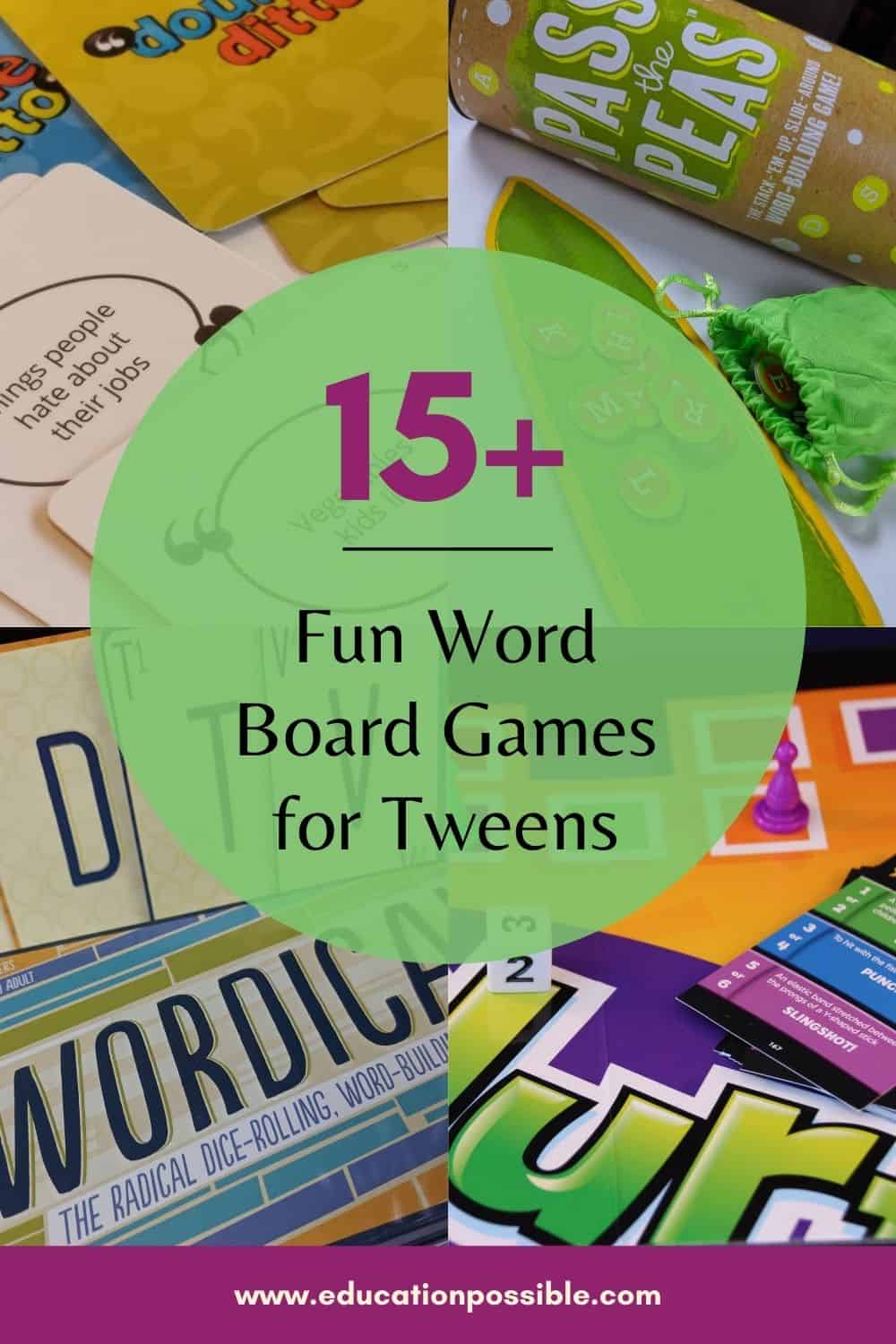
When middle schoolers play these vocabulary word games, they’re not just sitting there answering questions and spouting memorized facts. They’re playing with words and being creative.
Fun language arts games help teens get comfortable with spelling, vocabulary, and building words. All of which improve their reading and writing skills.
Personally, I think the days of giving kids long lists of words to memorize for spelling and vocabulary are long gone.
Tweens learn better when they’re immersed in a subject instead of just retaining facts.
One way to engage your homeschooler in language is to play games specifically designed for word building. As they play, they’ll be shoring up their spelling skills, building their vocabulary and improving their reading skills, all while having some fun.
Board games also have an element of friendly competition built in, so your older kids will be busy trying to beat you and each other, and they’ll probably forget they’re actually learning.
Not only are these word games perfect for language arts class, they’re so enjoyable that they make great additions to your family game night.
The ultimate goal is to raise kids who can communicate effectively, whether written or verbally, so I’m all for using whatever tools work to accomplish this.
These board games and card games are fun to play and excellent tools to add to your language arts plans.
How to Use Board Games in the Classroom
So how can you incorporate board games like these into your classroom or homeschool? It’s actually easier than you think!
- Set aside your language arts curriculum for the day (especially any spelling or vocabulary plans) and play a game instead.
- Transform a standard game by using the facts you’re teaching as the clues.
- Play a word game during lunch. It’s simple to pull out one of these games while you’re sitting at the table eating, and it won’t take any time away from your school day.
- When kids finish their work early or after you give a test, use a word game as a reward.
- If you usually take a day off during the week or have one where your teen has a lighter course load, take an hour to play a game or two.
- Add these word board games to your next family game night. Everyone can benefit from expanding and strengthening their vocabulary. Plus, tweens will love trying to beat you in a word game.
Use games with small groups, individual play, or as a fun activity for the family.
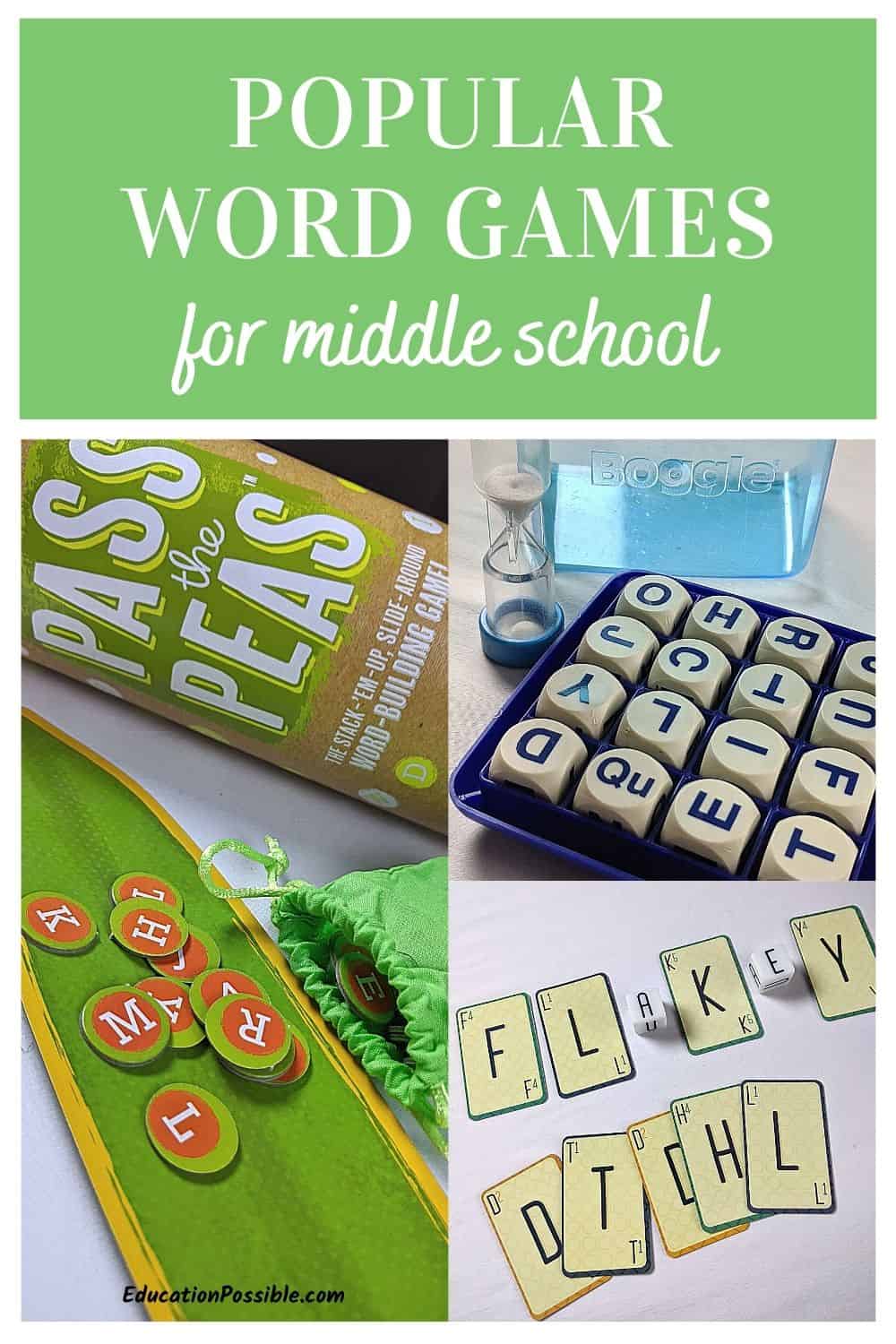
Any links in this post may be affiliate links. See my disclosure statement.
MORE LANGUAGE ARTS ACTIVITIES
Aside from word games, there are plenty of fun activities you can use to build the vocabulary of older children.
- Improve creative writing skills with Story Builders.
- Printable word games.
- Teach writing to teens with dysgraphia.
- These word tools will build confidence.
This is one of our favorite word games. Players race to write down two words that fit the category on the card, and if they match another player’s answer, they both earn points.
It’s an awesome family game.
You play this game with two stacks of cards — category cards and letter cards.
The top card on the category pile is turned over first. As soon as a letter card is flipped, players rush to be the first person to shout out something that fits the category and starts with the letter.
Players race to be the first one to find the word that hides in the letter spiral.
Sounds easy, but it can be quite challenging to find where the word begins and ends when you’re scrambling to beat your opponent.
Scattergories is a classic game that helps build vocabulary words.
Players start the round with a category list. Once the letter die is tossed, they must rush to write as many words as they can that fit the category and start with the chosen letter.
You need to be quick to finish before the time limit. But only unique answers count, so you’ll have to use your vocabulary to win.
As players move around the board, they try to guess the correct vocabulary word from the definition card.
If they give the wrong word, the other players have time to answer.
This game puts a unique twist on the classic crossword puzzle game.
Players try to score the most points by creating words, but they have the added choice of adding their letters on top of other ones.
The higher the pile, the more points players earn.
This game is played with 8 stacks of cards in the middle. When it’s your turn, you choose any of the top cards and create a word. The next player does the same, but then can use the remaining letters to play on your word.
Play continues until you use all the cards.
This is another game that’s played with category cards and letter cards.
However, with this game, when the cards are turned over, players try to be the last one to shout out a word that starts with the letter and matches the category.
The timer is random, so you never know when the time will end.
Players spin the spinner to determine the two letters and category for each round. Then, players race to write as many words as possible that start with one letter and contain the other and also fit the category.
Scrabble is a classic word game that’s still an excellent tool for building everyone’s spelling and vocabulary skills.
Players use their chosen tiles to make words, while trying to get the highest score possible.
This is a fun game to play and is incredibly portable, thanks to the handy banana pouch.
There are lots of variations on the gameplay of Bananagrams, so you’ll never get bored playing. In the classic play, players use their tiles to make words in a crossword-style form.
Boggle is a fun sight word game that’s been around for years.
Players put the lid on and shake the letter dice. Once they settle, start the timer and try to find as many simple words in the letters as you can.
Write them down on a piece of paper before time runs out.
Players are given 20 tiles, and a 5 tiered holder to begin.
When someone says go, everyone races to build 5 different words with their tiles and place them in the slots on the plastic holder.
As soon as someone builds their words, they shout, Dabble, and the round ends.
This vocabulary game includes 108 consonant cards and 2 vowel dice.
Players roll the vowel dice and use them with the consonant cards in their hand to build the highest scoring word.
This is a cute game that will definitely challenge tweens.
You give all players a paper pod and colored letters. When the timer begins, they use their letters to build a word on the pod. Then, they give the pod to the next player and the next round begins.
Now players use the word in front of them and their remaining letters to build a new word.
When your pod gets back around to you, you count the number of letters in your color and that’s your score for the round.
This game will definitely get your tween’s creative juices flowing.
There are 9 dice with pictures on each side. To begin, a player rolls the dice and tells a story, trying to include as many of the pictures as possible.
This is a great game to take along to parties or on a family trip.
There are a bunch of other dice/picture variations you can choose from too.
Here’s how we use Story Cubes in our homeschool.
Hopefully, you’ve seen how easy it is to help your teens build their language arts skills through games. Plus, they’re a lot of fun for middle school students!
Remember that your vocabulary is like a muscle. The more you use it and work it, the stronger it gets. And word board games are a good way to get older kids excited about English language arts.
Don’t let tweens just sit there answering questions and spouting memorized facts. Take some time to play these word games in your homeschool and watch how quickly everyone’s language improves.
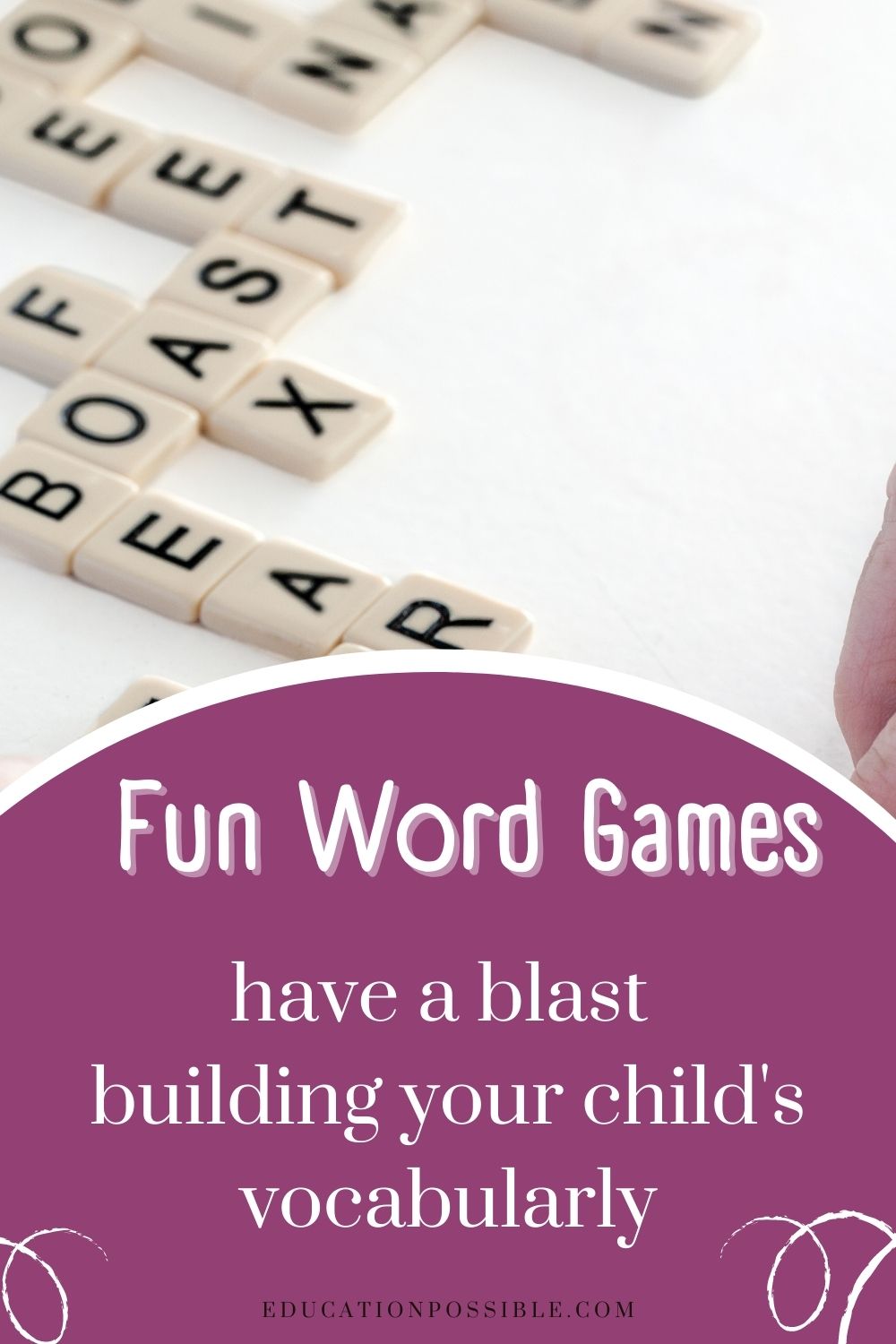
WHAT’S YOUR FAVORITE WORD Board GAME?
- Bio
- Latest Posts
I love homeschooling! Learning is a way of life for our family. Most days you will find us exploring our Central Florida community, having fun while learning. I am constantly looking for new and interactive ways to engage my older children.











































